#relatable to a certain extent. unforgivable in another.
Text
i love zenos so much
#⋯ ꒰ა starry thoughts ໒꒱ *·˚#he's honestly such an intriguing and complex character#relatable to a certain extent. unforgivable in another.#hmm... the garlean royal family...... to say i love them would be wrong#but as individuals. hm. big fan of emet and zenos and not as much for varis#but i don't really hate him per say. he's... well. i could blame the way he is on emet#but the way emet is. it is because of Yeah. so honestly i don't hate them fr#it's sort of really a tree and you can't separate the branches?? i don't really know#emet... depending on what you look at in him i either do not agree with him or i really do#he's. a Villain. with Heroic qualities. a Hero. with Villainous qualities?#he is a hero to his people and a villain for us. but then we become his friend as well and... awh man.#personally i really love emet as an antag bcs not once does he lie to us (his title means angel of truth after all)#he manages to... get what he wants until we obviously defeat him. and he does so without any deception#hell he even REVEALS to us things we didn't know. and... he wanted us to...... understand. remember. and. god#varis in late stb patches (was it the last one? 4.5?) was... it makes my eyebrows furrow#i can't explain just why. it's complicated i think#he's interesting. he's at fault as to why zenos is like that but the way he is is also because of emet and the ascians#and hey even if you look at their characters and just Why. of course it does not absolve them of their sins#looking at it though in a bit of a mil/gram way however... i think they are. Forgivable. for me#anyways uhm. yeah#zenos i actually never disliked but i can see why people would!#hmm#there's this one discussion that honestly annoys me about emet/ascians/garlean empire#i don't want to say it here but ifykyk. tbh i can see why and i respect it but i really don't agree. to reduce their characters to that is#ignoring their reasonings that are very different and the fact it is. literally incomparable. fiction to reality. argh. going way too far w#that imo! like honestly just. you don't really get their character/s <//3#okay i stop rambling here it is around 20 minutes away from 11 pm!
1 note
·
View note
Text
hehe part 2 for this fic, with the aftermath and consequences of chase's tic attack. it's about 1.5K words :)
cw: house is not exactly nice to chase. in fact, he's rather rude
Wilson reenters his office with a small plastic cup of water in hand, ready to offer it to Chase, only to find the younger doctor completely passed out on the couch. He's lying on his side, one elbow bent with his head resting on his forearm, while his opposite hand brushes against the back of his neck. His right knee is approaching his chest, the left leg not-quite straight where it's sprawled across the length of the couch. His chest rises and falls steadily with the even breaths of someone lost to unconsciousness, and for a moment, Wilson's chest tightens with that familiar sensation of concern.
He's known Chase for almost a year, now, and Wilson honestly thinks he might be even more familiar with his condition than House is. After all, it's not exactly a secret; Cuddy was required by HR to inform every single one of the departments that could potentially have contact with the diagnostic fellows when she initially hired Chase, which was pretty much the entire hospital. There aren't many people at PPTH who don't know that Chase has Tourette's, which only makes the effort he puts into hiding it from near everyone aside from his colleagues and House that much more concerning.
Working in the environment that he does, in the field that he does, with the people that Chase does, though...
He'd be lying if he claimed not to understand it.
Wilson sets the plastic cup down on the edge of his desk as he sits, blowing out a slow breath. Chase's features are slack in sleep, free of the guilt that had permeated his entire being only minutes ago. While his paperwork is staring him in the face, insistent, Wilson can't help but notice how much younger Chase looks while he's unconscious. With the level he's working at, it's easy to forget he's only twenty-five, that he's still prone to idolatry and that he should (but isn't) be relatively naïve to just how unforgiving the medical field can be.
He's tried to help. Cuddy, unfortunately, never actually figured out just how to broach the topic, and House is... well, House is House. Cameron would be overbearing, and Foreman oscillates between displaying complete indifference and sympathy. Wilson still can't talk with Chase about it, but he's at least been able to make Chase feel more comfortable in his presence. It just... doesn't seem to land.
There's a headache beginning to grow in his temples. Wilson presses his fingertips into his left eye, grimacing slightly.
As if on cue, House bursts through the door. "Oh, Wilson!" he calls, sing-song, his cane visible before he is. "Have you seen my doctor? He's got this ridiculous British accent, dumb floppy hair, and an unfortunate penchant for imitating seizure patients while standing."
Wilson sighs. "House," he starts.
"He went out to the balcony, and since he hasn't returned to the conference room to do his job, I assume he came back in through your office," House expounds. "Now, what did you do to my doctor?"
"House."
"What?" House's gaze flits around the room, as if looking for evidence of Chase's presence, and eventually, lands on the couch, where Chase is still fast asleep. He blinks, and then his eyes narrow with an odd mix of curiosity and concern as he takes in the sight of Chase sprawled out on the couch.
Wilson keeps an eye on House, knowing this encounter can go any of several different ways. It's far easier for House to tease Chase instead of actually dealing with the fact that he can relate to Chase, to a certain extent; House with his cane, and Chase with his Tourette's. They're both struggling, and they're both defensive, refusing to accept even a sliver of help until it's desperate.
House is silent for another long moment until he asks, rather bluntly, "Is he dead?"
For the third time since the elder doctor entered, Wilson sighs, "House."
Chase stirs in his sleep, nuzzling deeper into the rough, worn fabric of the couch. His eyebrows furrow, pinching together tightly before his forehead smooths out again. He continues sleeping, undisturbed.
House leans down slightly, leaning heavily on his cane. He examines Chase's face closely, as if the doctor is his newest case. "He's alive. Seriously, Wilson, did you break my doctor?"
Wilson rolls his eyes, not in the mood to deal with House today. "No, House. Chase had a tic attack after leaving the conference room where you and your fellows were gathered. Was it either of them, or were you being an ass?"
"I have no idea what you're talking about."
"Did you set it off?" Wilson demands.
"Now, why would I do that? I need him to work," House says, then suddenly, increases his volume. "Can't have my doctor sleeping through the day, can I?"
Wilson's teeth clench with anger as Chase startles awake, gasping, and scrambles away from House, driving himself off the couch and onto the floor, where his body immediately tenses with a wave of tics. His head jerks, his left arm spasms, and he involuntarily lets out a frustrated whine before his breath catches in yet another tic.
"Morning, Sleeping Beauty," House says, unfazed by Chase's distress. A smirk actually crosses over his face as he watches the younger attempt to regain control, leaning casually on his cane, observing Chase like he's an animal in a zoo. "Naptime's over."
Wilson's standing from his desk by the time Chase is on the floor, and he's crouched at his side before House is done speaking, trying to soothe him. His gaze whips over to House and he spits furiously, "House, what the hell?"
"House, what the hell?" Chase repeats, and shrinks even further into himself as the echolalia tic surfaces.
House raises an amused eyebrow. "Finally sticking up for yourself?"
"It's a stick-up!" Chase tics loudly in response, then jerks forward while his right hand lifts, fingers bent to mimic a gun as his head twists to the side.
Wilson is torn between concern and frustration as he watches House interact with Chase. On the one hand, he's worried about Chase, who's now caught in a debilitating cycle of tics, which are only exacerbated by the stress of the situation and House's presence, and on the other, he's furious with House's usual display of insensitivity still being directed toward his clearly-struggling employee. Diffusion is an ideal, and one he knows he likely won't have.
"House, this isn't helping," Wilson snaps, his voice laced with anger. "Can't you see he's struggling?"
The smirk on House's face doesn't waver, but he straightens up and takes a step even closer to Chase, who's still sat on the floor, contending with the relentless tics. "Struggling? Looks more like a comedy routine to me," he quips.
Chase's eyes are wide with embarrassment and discomfort. His gaze is darting between Wilson and House, and the flush on his cheeks is from more than just exertion. Watching him, Wilson can't hold back the genuine rush of anger. He snaps, "House, enough!"
The elder doctor freezes. Wilson brings Chase to an upright position, being careful not to hold onto him too tightly or move too suddenly. "You need to leave. Right now."
House's smirk finally, finally fades, replaced by a hint of annoyance and what could almost be mistaken for concern. "Fine," he grumbles, "but only because he's useless to me like this." With that, he turns and limps out of the room, leaving Wilson alone with Chase.
He looks utterly miserable, his body already pushed to the limit after the earlier tic attack and only being taxed further. His tics have started to subside slightly, likely due to the reduction in stress, but he's visibly shaken and exhausted. Wilson leaves his side for a minute to retrieve the cup of water he'd placed on his desk earlier and gently offers it to Chase, who shakes his head as his right arm jerks up toward his chest.
"Sorry," he whispers. He's bright red with embarrassment.
Wilson only shakes his head. "You don't need to apologize, Chase. Never for this. House can be... well, you know how he is."
Chase nods, his gaze focused on the floor as a sharp whistle forces itself out of his lips, followed by a second repetition, and then a third. Once it finally lets him go, he bursts. "Why can't he give me a break? He's got his leg, and I've got this. Why is it so tolerable for him to be an ass, but the second my condition flares up, I'm an inconvenience and a liability?"
Wilson places a gentle hand on Chase's shoulder, unable to offer much else. "I don't know, Chase. I'll talk to him about it. My door is always open to you if you need a breather, though."
Chase manages a small, grateful smile. "Thank you, Wilson."
As his tics continue to wind down, Wilson can't help but feel a sense of admiration for Chase. Despite everything, he's still willing to work with House. It's a startling display of maturity; at twenty-five, Wilson probably would have quit the second he'd pulled himself together. But Chase only gathers himself together and moves on, again and again and again.
#h/ouse m/d whumpfic#whumpfic#h/ouse m/d#r/obert c/hase#j/ames w/ilson#g/regory h/ouse#t/ourette's au#swts fic
6 notes
·
View notes
Text
The Todoroki Family Arc: Dabi and Representation for Abuse Victims
Something I’d like to address regarding all of this Todoroki family discourse is the importance of representation for abuse victims, specifically when it comes to the topic of forgiveness. Many of us who are victims of abuse aren’t willing to forgive our abusers, and there is nothing wrong with taking that stance. The concept of forgiveness of abuse is an especially hard pill to swallow when that forgiveness is for the sake of the abuser and not the victim (i.e., in this case, forgiveness for the sake of Enji’s redemption arc). So this makes the current Todoroki family/Endeavor redemption arc so incredibly difficult to read, as all of the ‘good’ Todorokis are either already willing to forgive (or on their way to forgiving) Enji's long-term, narcissistic abuse.
It’s true that in canon Enji has explicitly stated that he’s not asking for forgiveness and that his family members don’t have to forgive him. Whether or not he truly understands what that means is up for debate (I’ve got a lot to say on Enji’s redemption arc, but that’ll be for another post). But for the sake of this post, let’s state that he genuinely means it, which would be great as it shows an awareness on his part of how unforgivable his actions are. This great and all, except the words lose their weight/significance when every single ‘normal’ family member is on track to forgive him. It would hold much more weight to show he doesn’t get forgiven by everyone, which will require him to at least to some extent, live with the consequences of his actions (e.g., being alone/ostracized from some family members).
So, let’s go through the Todoroki family members who are in the process of forgiving, have already forgiven, or are on their way to forgiving Enji, and how I personally respond to their forgiveness. Of course, all of this will be heavily influenced by my personal opinions and personal experiences, however I think that’s fair – as a person who’s endured long-term childhood abuse from a parent, I’d hope that my opinions (and others like me) will have some weight in the conversation surrounding domestic violence, even within the context of fiction.
Rei:
Rei has shown signs of starting to forgive Endeavor as evidenced by defending him to her children.
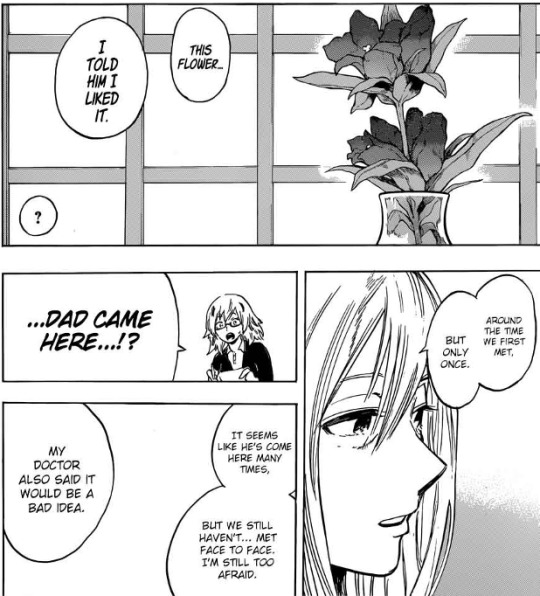
I do appreciate that she states that she’s still too scared to see her husband, and that the doctor states it’s not a good idea. That all makes perfect sense. But the idea that she’s willing to give him a chance to redeem himself because he sends her flowers? I absolutely cannot identify with this in any which way. Her marriage was forced by Endeavor, her sole purpose to bear him cold/hot quirk children. She may have later grown to love him, who knows; we do know she was willing at least have Fuyumi with him, since she suggested it… (although there is a lot to unpack around that too, which I’ll also save for a different post). Even if she did love Enji (and a part of her may still love him, as some of us may feel towards our abusers) she went through YEARS of abuse to the point that she had a psychotic break and had to be institutionalized. To suggest that she’s willing to begin the road of forgiveness because he sends her flowers is just completely unrealistic, and I personally can’t identify with her at all (also, as a sidenote: if my abuser and the cause of my psychosis, who I’m too afraid to see, is sending me gifts, the last thing I would want would be to see those gifts displayed in my room as a constant reminder of them).
Fuyumi:
It’s clear that Fuyumi is well on her way to forgiving her father (if she hasn’t done so already).
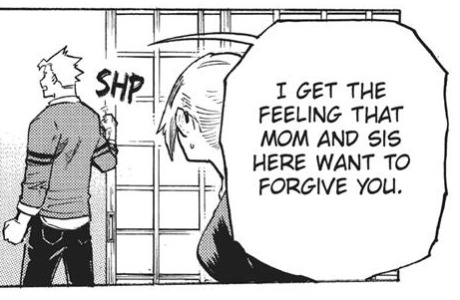
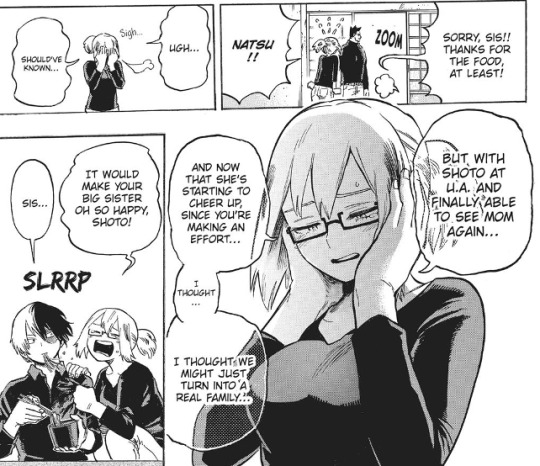
Fuyumi wants nothing more than to piece her family back together, which is entirely fine if that’s what she wants. What bothers me however, is that she’s willing to do so by sweeping the family drama under the rug in an attempt at keeping the illusion of a healthy, loving family (i.e., one that’s not broken by abuse). Why can’t she have this happy family with her brothers and her mother? Why does she feel the need to have Enji in that family picture, considering all he’s done to them? Her whole “it would make your sister happy” is, in my opinion, guilt-tripping and selfish. I don’t think she’s a mean person, and she may not be aware that her behavior could be damaging. But her motivations are clearly self-focused, as she’s not willing to address her family’s issues in a way that validates everyone’s feelings. She just wants everyone to ‘play nice.’
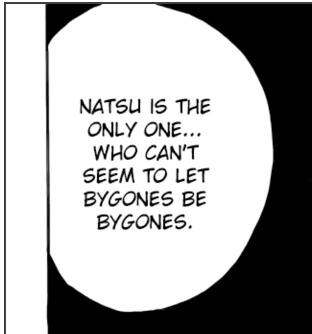
It’s this dismissive behavior, a willingness to overlook the harm of the abuser for the sake of trying to keep a semblance of normalcy when things clearly aren’t normal, that has me label her as an abuse apologist. It’s not intended to be malicious of course; I do think she believes she means well. But how does ignoring the abuse her family endured help anyone? Will this ever get addressed by Horikoshi? TBH, I doubt it, but we’ll just have to wait and see. But one thing is for sure, she’s definitely the most forgiving out of all of her siblings.
Natsuo:
I love this guy. Truly. So far, he’s probably the MOST relatable for me…
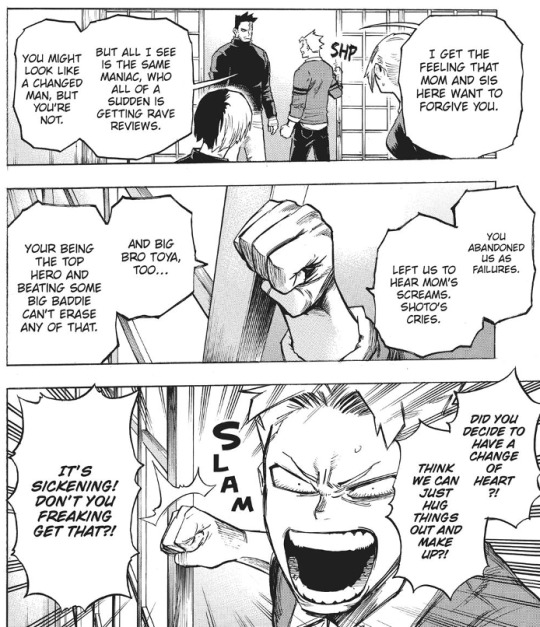
Look at that. Beautiful. I love it. It’s everything I want. He’s unforgiving, holding his long-time abusive father accountable (regardless of how good of a hero he is), while still being a good person (lookin’ at you, Dabi…) all in one breath.
SO… why am I including him in this? Natsuo so far seems to be holding out, but I wouldn’t be surprised if Horikoshi writes him in the direction of forgiveness, especially after this Dabi/Touya reveal. I feel like there’s already been hints at it, and it’s just a matter of time before he inevitably gets written as forgiving his father as well.

Here, you see his mother’s words getting into his head; he’s thinking heavily about what she’s said to him. He doesn’t like the idea of his father looking for redemption, and holds his own disbelief around his father “trying to make sense of it all.” But clearly he values his mother’s opinion on the matter, which will have an impact on his own views/beliefs. Plus, the added pressure of seeing his other family members forgive his father will also have an impact on his stance, either by making him dig his heels in further in resistance, or by accepting their stance on it and as such be one step closer to forgiving Enji himself.


Here, he’s hearing Enji’s words and recalling Midoriya talking to Shouto earlier in the evening. He’s drawing a parallel between what it means to be a kind person and what it means to forgive. It’s followed up by his father’s confession of atonement, which clearly has an impact on Natsuo. His experience here is visceral and entirely relatable; while Enji’s words may sound nice and genuine, it does little to assuage Natsuo of the painful memories he harbors and the damage that his father has caused over the years.
He’s still holding stubbornly onto his anger, unwilling to forgive… but the way it’s playing out, it’ll only be a matter of time. Maybe it’ll be yet another near-death experience for Endeavor, this time by Touya’s hand. Or maybe he’ll feel that deep cut of betrayal from Touya/Dabi that makes him let go of his own anger/darkness in his heart out of a fear of letting it consume him the way it did his older brother. Either way, I see it ending up there. We don’t know for certain yet, of course… but my money is on Natsuo forgiving his father by the end, so I’m holding back on getting too attached.
Shouto:
Shouto also seems to be becoming more open to forgiveness, despite all he’s gone through (and witnessed his mother go through). There’s a lot surrounding why this may be… perhaps it was watching the near-death experience of Enji in the battle with High-End… (which, hey, watching someone you care about nearly die, even if that person is your abuser, would be rough to watch).
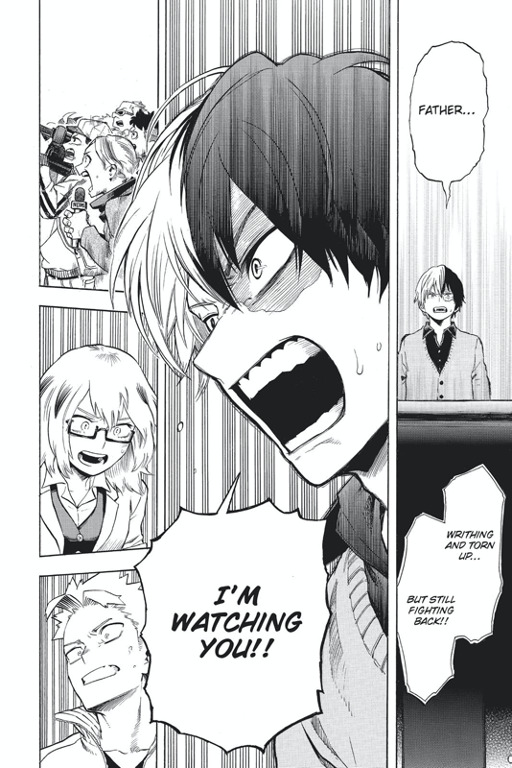

Or watching his father be a badass hero (because let’s face it, Enji is an excellent fighter) that the public looks to for hope. Keep in mind, this happened after Enji had told Shouto he wanted to be worthy of the #1 position and of being Shouto’s father; so Enji has just shown to Shouto that he’s (at least by Hero Society’s standards) worthy of being #1, and now he’s trying to make amends with his family (mm, check out that need for validation…).
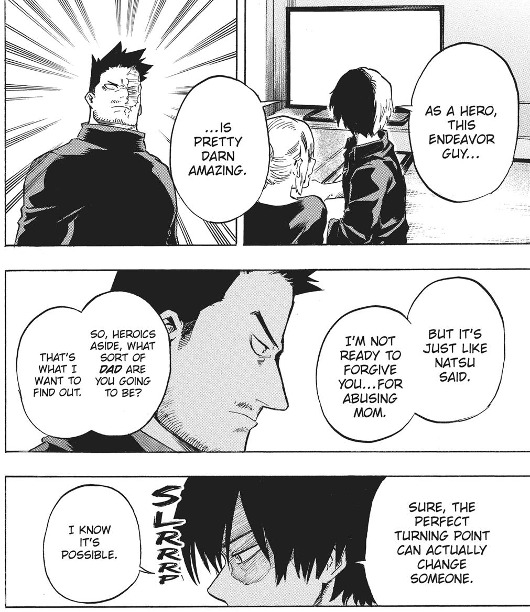
Clearly, Shouto is giving his father a chance to redeem himself.
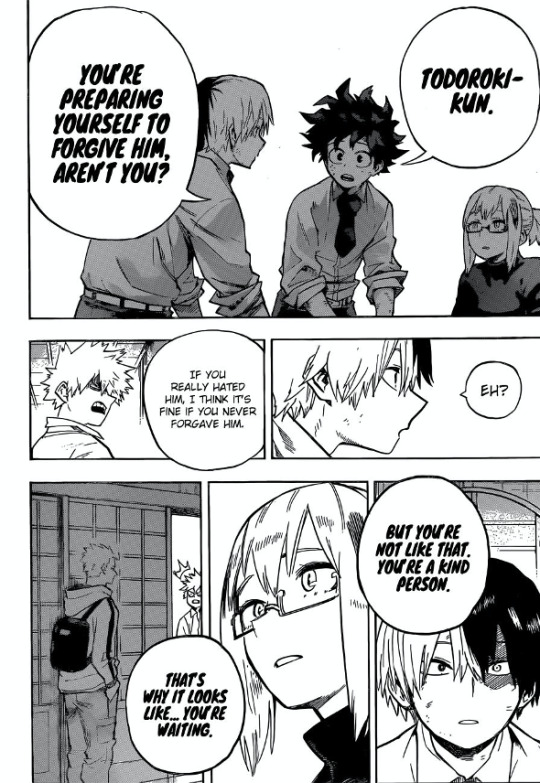
And, of course, we have this page as well, which draws the comparison of being a kind person also being a forgiving person (which, quite frankly, isn’t true - you can definitely be a kind person and still not forgive someone who’s done long-term harm to you). Regardless, it’s clearly being shown that Shouto is obviously heading into forgiveness. Once again, the forgiveness itself isn’t bad… it’s how it’s being portrayed. As someone who’s been abused by someone who’s supposed to take care of them and love them, I can say with certainty that you don’t really care that much about how good that person is at their job. It shouldn’t matter that Enji is a great hero; he’s always been a great hero (that’s why he was second only to All Might). What matters is how Enji is as a father, and it’s well established that he’s failed his entire family, by choice, for years. Shouto states as such to him, saying he’ll watch to see what kind of father he becomes. But this follows immediately after the battle with High-End, which implies that Shouto is basing his willingness to forgive his father off of Enji’s heroics and public acceptance as the symbol of hope. Why this would sway Shouto’s view of his father enough to consider forgiveness for years of physical and psychological damage escapes me.
Now, let’s be clear that forgiveness of an abuser isn’t impossible, but it’s certainly not an easy task. Additionally, the decision to forgive hinges on a lot of things, including whether or not the abuser is worthy of forgiveness (i.e., are the crimes he’s committed against his family redeemable? Is he truly genuinely feeling guilty about what he’s done? Does he understand the magnitude of what he’s done? Is he acting selflessly, or is his quest for redemption rooted in selfishness (e.g., need for acceptance, a way to hold onto one’s power/importance within the family dynamic, etc.)?). In many cases, especially cases where the abuse is long-term as it’s portrayed as being for the Todoroki family, and as mine was growing up, forgiveness isn’t really on the victim’s mind. The damage done by the abuser is so long lasting, leaving a permanent imprint on how we think, act, and behave. It shapes us, especially when it occurs in the formative years of childhood, affecting how we connect with others and how we view ourselves.
So, sharing a few contrite moments with the abuser (in this case, Enji) and seeing some positive situations (e.g., watching him kick ass on TV, be kind to his kids, etc.) do little to persuade me into forgiveness of a man who willingly, repeatedly, chose to abuse his family for at least a decade. His abuse was physical, mental, and emotional. Even if his desire for redemption is genuine, the quickness with which the good characters here begin to forgive him feels slightly forced for the sake of his redemption arc, and is therefore unrelatable. And that is the crux of the issue. Enji’s redemption should be just as much about the healing of his victims as it should be about him (if not more so). However, that doesn’t seem to be the case. So, what we get is a family portrayal that is in favor of the abuser.
So, all of the ‘good’ Todorokis are working toward forgiveness of their abuser. Great. So, where does that leave those of us who aren’t on board with forgiveness? Those of us who see our own abuse, our own history, within this story and are not (and will not) ever forgive our abuser for entirely reasonable and justifiable reasons? Where is our representation in a story that, for all intents and purposes, is meant to be about the ramifications of abuse (and by proxy, victims of abuse)?
Our only remaining choice? Dabi, of course... the psychopath who’s bent on destroying his abuser’s life and the hero society that’s, in some ways, created and supported him.
I think a major reason Dabi is so loved by some of us is that we can identify with that anger, that need for retribution/justice. Are all of us entirely on board with how Dabi has decided to go about this retribution by doing whatever it takes no matter who it hurts or what innocent lives are lost? No, of course not. But in a story where we’re looking for a sense of justice, where the long-term serial abuser DOESN’T get to walk away free with his abused family still by his side/supporting him, what other options do we have? He’s the ONLY ONE who seems to be willing to hold Enji accountable for what he’s done and who sees the hypocrisy in his position as a symbol of hope in contrast to who he has been behind closed doors with his family. So THAT is what we’re defending when we defend Dabi. We’re NOT defending his murders, or him attempting to kill his brother, or ANY of that. We might understand where that darkness is coming from/what’s caused it and empathize with it, but we don’t EXCUSE it.
Now, obviously the story isn’t finished yet, so there’s no way to know for sure where Horikoshi will take this redemption arc. We don’t know if all of the family members really will forgive Endeavor or not, and if Enji will ever be fully welcomed into the family fold. The airing of the Todoroki family’s dirty laundry and its impacts on shining a light on the cracks in hero society give me hope. Also, the diversity across the Todoroki family of how each person copes that that abuse is also well done. That’s why I’m still invested in this story, that’s why I’m still reading it. But we only have what we’ve been shown to go on, and at the moment, there are major aspects of this story that are lacking. The diversity in how each family member handles their abuse and their relationship with their abuser starts to lose its impact when that diversity is gradually washed out in favor of universal forgiveness.
Also, where the manga is currently at gives me concern about the kind of message this story is sending to its readers. I often see others say: “it’s just fiction, relax.” Yes, it is fiction. And when we read fiction, we all search for a piece of ourselves within the story. You can’t have a story that centers around domestic abuse and not have abuse victims gravitate towards it, hoping for accurate representation. And most importantly, even though this is ‘just a story,’ what message is it sending when the only person not willing to excuse/forgive Enji is a psychopath who’s been driven insane by his father’s abuse (and possible by his family’s inability/unwillingness to address said abuse)? What message does it send to abuse victims? What message does it send to those who have never experienced abuse and are learning about it through this fictional representation? To say that this isn’t relevant in a real-world way is inaccurate at best and damaging at worst; and even if it may not hold relevance for some within a real-world setting, for many of us it does and as such the implications and impacts of it should be respected, even if you may not agree with it. In short, for some of us, this is personal.
Now, do I think that every family member should curse Enji into the sun? No, as satisfying as that would be for me. I’d be perfectly happy if some family members forgive and some don’t. Why? Because it’s realistic. It makes sense, because it depends on each character’s unique, personal experiences. Some will forgive, some won’t, and some will continue to defend and provide excuses for said abuser – all of these positions within the abused family dynamic are real and exist. I just wish BNHA would also allow a space for us abuse victims who aren’t willing to forgive – a space that isn’t villainized.
107 notes
·
View notes
Note
I'll try to keep it short because you're very kind but I'm becoming annoying... I actually like Soichiro. It's his morals I cannot stand. In fact, in line with his, I like Matsuda's and even Light's variations more, even with all the darkness they entail, because they're more critical. I adore L and find him relatable, but I'm not so sure if I'd like him as a person in real life, and yet I again like his morals more than Soichiro's. I still think Soichiro is generally a better person than any of the others. I still dislike his morals the most. When I say at the opposite end of Soichiro in the moral spectrum is where Near stands I'm not talking just about my personal liking, but as I interpret their views on morality. Maybe there's some detail of the manga I'm forgetting (I truly have to reread it), but Soichiro didn't seem very critical about... anything, while Near states something like "even if god came and told me this is good and this is bad and this is The Truth I'd still consider and come to my own conclusion". I like that. I care less about someone getting a moral with what I may consider a degree of grey if they do that. I myself have very strong morals that nonetheless have degrees of grey; strong doesn't mean pure. My grey and someone else's grey might be very different. But I've developed them, not accepted them blindly. Near of course, Mello, L, and even Light and Matsuda do this, but Soichiro generally doesn't. And I dislike that greatly. In fact, I think I'd find him kind in real life, and likeable, but I'd not really like him because I can't really bring myself to like someone like that even when they're kind and compassionate and good. I'm already talking more than I intended but I'll try to point out what bothers me of his attitude.
Soichiro is very very anti Kira, but he's working for a government with the death penalty and he doesn't seem to consider that even for a moment. For him, that the government does it is justifiable but monstrous if a person does it. He doesn't really have a justification, it's just like that because it's as it is. He's very against L's methods, buy L uses people who were going to die anyway at the very moment he uses them either way because of the death penalty, because of the government. From a government pov, if the government were to do what L does, it'd be something terrible. From an individual pov? Not so much. It's ugly, but it's beyond himself whether that people die or not, and his decisions are easily justifiable from an individual pov: they're going to die irrevocably, that very day at that very time, and he is using what he can to solve a very complicated case that is taking many lives, and he even might use the moral support of "I'm giving the prisoners the chance of choosing, with the potential reward of lifelong imprisonment instead of death". And again, while a government doing that is terrible, it's not as terrible for a person. L is a private detective, an individual. People can be fallible. Governments shouldn't. What L does might be justifiable, if ugly, for a person, but it would be unforgivable for the government to do. But the government lies on L and it's L who takes the slander of the rest of the Task Force. And that's what Soichiro doesn't see, and that's what bugs me. Soichiro sides with the government and the laws no matter what, no matter if they're terrible and are actually the cause if indirectly of the terrible things L is able to do (I'd have to reread to be completely comfortable affirming this, but Soichiro's attitude towards the government reminds me a bit of Mikami and Misa to some extent).
Soichiro hates Kira, and hates and criticises L's methods and his ruthlessness, but doesn't even consider for one moment the problem is not L. The problem is not the 24 yo boy/man, the problem is his government, that has the dead penalty and actually let's a private detective carry on with the investigation and do as he pleases (and I'm not even taking into consideration how L's upbringing and the lowkey if fun exploitation he was subrmited to have most probably influenced if not determined the way he acts in these cases, because while it's intriguing it'd feel like justifying L out of pity, and either way Soichiro doesn't know that; but I mention this because L's entire past at Wammy's, like the other children's, is another very terrible move from governments and adults in responsibility positions). The problem is Interpol, the governments in general, blatantly saying L is ruthless but not even setting rules when working with him. And I think it would actually have been very easy to stop L doing those things. Just change the rules of the game, tell him beforehand there are a few things he can't do. It's a game after all. Of course L would still exploit the moral and legal vacuums of the rules as he pleased, as one does when playing anything, but the government wouldn't have given him totally free way.
I'm not sure if I'm explaining myself very well. Years ago in a class I talked about the difference between personal vengeance and the death penalty. I feel this is similar. A person is fallible. A government should be able to stand over licit murder. L manipulating people to prove a point is ugly. A government doing that or letting someone free way to do whatever is terrible. L does whatever, and as an individual is not so horrible as it is that the governments internationally actually let him do whatever even knowing beforehand without setting rules. Soichiro sees this and it doesn't even cross his mind for a moment to criticise the government he's working with. Also, he considers his morals the best, which makes sense in a first person pov (why support x morals if you don't think they're the best? I'm not critisising this), but he's very... imposing about them, while as I say not being precisely the most critical thinker. That Soichiro is like this, morally (I'm not even talking about the policeman aspect though that's so often talked about in the fandom), makes a lot of sense to how Light ends up being Kira, and with how Matsuda thinks and acts. And I find that very intriguing, but I can't stand Soichiro's simplistic morals and his better-than-you attitude even though he's a generally good person. That's why I dislike his morals the most (of course you don't have to agree!). I don't stand by Near's morals either, but I like his "god could come and tell me and still I'd doubt" attitude. It's what makes gods mad in basically every mythology, but I love that kind of thought process. I'm very much like that too.
I'm so sorry this is so long. I tried to cut, but I got the impression it'd make it even less clear or more difficult to understand. Or maybe the lack of clarity lies precisely on how repetitive and long this is. I'd like to think English not being my first language has to do with this, but honestly the problem is most probably just me. I hope I made the point understandable enough, though. And thanks for your patience. I really liked that post of Near someone sent as an opinion and how you replied! Very interesting takes on both ends.
Hi again! You have some very thought-provoking points about it all, and don't worry, your English is excellent.
I loved Near's stance about these things as well, and that's something that really bothered me when growing up about some authority figures and institutions being really totalitarian and silencing of doubts or stances they deemed too negative or incorrect to voice aloud. I value having freedom of choice and the ability to think critically about everything immensely. Maybe it's because I went to a very strict and sheltering and weird little school as a child that tried very hard to indoctrinate me with a specific worldview, and always shamed and silenced anyone who disagreed or questioned them or felt like an outsider or wanted to have a different point of view. I remember relating the most to Matsuda on the task force when I first watched the show as a teen, because he was always speaking up with his devil's advocate questions or confusions. The way Soichiro and the others usually yell and scold and shame him for this bothered me a lot, because I wanted them to discuss things openly so I could see all the different sides of the arguments more clearly. Actually, I think this is a pretty culturally similar thing between Japan and Canada (where I am from). There's a strong emphasis on doing what's best for the entire group instead of just yourself, and being too controversial or outspoken or individualistic about certain things is often taboo and frowned upon as a big social faux pas. It's possibly quite a bit stronger pressure toward obedience and conformity and politeness in Japan in certain ways as well, but I don't know for sure as I haven't lived there myself.
I think Soichiro had a bit of nuance and flexibility with his morals and his stances in various instances throughout the plot, and to me he seemingly tries hard to see things from other angles during complicated moments in what must be one of the most difficult situations he could possibly face as both a police chief and a parent. But it's true he never seemed to doubt that upholding the laws already in place and the way his government punishes the convicted were the "correct" ways society should function. I think this series would be a really interesting one to discuss in a class that talks about stuff like justice and the death penalty and law and ethics and such for how many of these things it touches on in an entertaining and thought-provoking way!
19 notes
·
View notes
Photo

Southbound : Chapter 6
After the Cullens leave her behind, Bella is left to pick up the pieces by herself. A year after her eighteenth birthday, a split second decision lands her in her truck, running far away from everything she has ever known. She decides to go south. What will she find in San Angelo, Texas?
After Peter left, the air between us felt stagnant, cold, like a pond left uncovered in the first freeze of winter. The man in front of me didn’t smile, didn’t even fake a breath for my own comfort. I know he could feel the shard of glass slowly sinking into the pit of my stomach; the fact of its direction changing, resigning, surpassing my throat to lodge itself in my skull as a sharp ache not lost on me.
And I’m sure, not on him.
I knew Jasper. I had sat feet from him not even years before. What had changed in those aching months? What kind of lust seeped into his unbreakable bones since? This man was toothier, slumping shoulders spread wide against the settee. Who was this brother of his and why did he have Jasper now? I mean— he had explained just moments ago the short extent of Alice and his separation, but the questions were tar in my brainstem: unmoving, guilty, painful. The faint imprint memory of his hand on my knee softened the creases under my eyes. His eyes were nothing if not full of memories.
He scared the shit out of me. The worst part of me liked it.
The keys in my hand were jangling as I wrung my hands against the metal. They were ice cold from Peter’s grip and yet I never shied away from them, I rested into their cut, their steel mill scent. It’s all the comfort I had left in this unfamiliar sandy home.
“You never told me where you meant to end up, Isabella.”
The look on his face hadn’t changed from its hawk-like gaze, his mouth upturned in what was made to be sincere questioning.
My teeth seemed to buzz in my jaw as they clenched. I was stuck between trying to find the answer that made the most sense— but this far away haunted house was nowhere close to where I was headed. To be honest, I hadn’t even made a plan for my drive, the road had been a black licorice rope pulling me deeper and deeper south, its vines unswervable.
Those damn carmine irises were still on my face. My hand settled on the silver scar. “Somewhere without you— your kind.” There's a horrible dread that sinks deep into the pit of my lowest bones, down past the acid lining of my stomach. It wasn’t mine in the first place…
He smiled again. That fangy lip twitch he implemented earlier in his bedroom, his searing white canines glinting in the southern sun. Jasper did some twist of his knuckles as they rested on his denim knee, the bareness of the marble flesh punctuated.
“Do you truly think your life will not continue to be… supernatural?” He paused something big and let his lashes point away from me, his gaze settling right behind my head, “The world has never been that kind. Especially to you, Miss Swan.” The way his tongue curled around my name made something twist in my gut. Something that felt like finally breaching the top of a rollercoaster after clunking around in the seat for several minutes.
I took a breath, “No hope for me then, Mr. Cullen?”
“Whitlock, darlin. Mr. Whitlock.”
His correction was daring and quick, like a dare. The scared shitlessness was starting to turn.
“Oh?” I’m sure my eyes were the size of dinner plates served on the damn moon.
His quirk faltered as he refocused on the skin of my neck. “The Cullens aren’t the biggest fans of the ousted members keeping their name, I’m sure. Whitlock was my human name.”
My lip twitched, “Like Peter?” He did say they were brothers, it would make sense the tanner man kept it while Jasper stayed up north.
“He adopted it when I changed him in the twenties. He didn’t need to remember his own.”
The paint covering the living room walls was starting to feel warmer and warmer. There was a sort of mysticism in the air, the kind of feeling Phil said he got standing on the pitcher’s mound. This charge of electricity. And if I felt it— did the man in front of me do too?
“You changed Peter?”
A hum came from his Adam's apple. I quickly stopped staring at its vibration, focusing on my still hands. “Is that where you got that name? The ‘Major’?” My legs felt like salt blocks sat out for the new fawns.
Jasper kicked his foot out, inches from my own. “All in time, Isabella.”
Why the hell was that the question he kept dodging?
I nodded against my own snooping judgement and sat up straight, gripping the cut key again. “Peter said something about seeing my truck?” As if on cue the sound of a backfire sounding across at least an acre of dirt, the laugh of the man in question following in direct response.
He reminded me of a wilder, leaner, Emmett.
I didn't know if that was a good thing.
The blond rolled his eyes, something I would’ve passed out seeing months ago, which now just made him more and more intriguing. His hand raised without fantastical speed and made an ushering motion, inviting me silently to stand and follow him to the front door, not even twenty feet to our backs. I did as I… wasn't… told and raised to my shuffling feet, watching with barely suppressed intensity as he did the same, his shirt unbunching as his long legs swept past me. His strides were unhurried yet strong, quickly reaching the exit without me. Jasper’s slim fingers turned the knob gently and allowed the now open door to rest against his shoulder.
“I’m sure my brother will find you the moment you start walkin’. I have to get to some business caused by my early departure earlier.” My shoes scuffed the hardwood as I passed by him, the scent of firewood and malt whiskey light in the air of the threshold. I nodded again as I looked back at the giant southerner.
“So I’ll be making it back?” Half joking, half fearful the words slipped past my lips.
He smiled truly that time, his teeth hidden behind his smile. “Of course Isabella. No one plans to kill you… for as long as I can see.”
The door closed slowly as I turned away from him in only slight ease, the sound of his footsteps behind it unrecognizable. Texas dry wind called to me from the bare porch, wooden planks creaking ever so slightly underneath my weight. The world was quiet— in only a way nature could be quiet. Silence without loneliness.
Another diesel racket sounded over the slight hill in the property, some of the only patches clustered with shruby, overgrown trees.
“Bell!”
There was a smile hiding under the surface of my skin, not the least undetectable. My stride started up again as I half jogged through the crab grass and rusty dirt. It had to be almost two or three o’clock now, the sun high and bright in the cloudless sky.
Had the day gone by so fast— or so slow?
I couldn’t decide which it was. Not yet. Not now.
The baked exterior of my cab was just in sight over the small hill, somehow further away from the bare dirt trail than it had been this morning. Had the black eyed man… moved it? It didn’t run, at least not by my hand, he would’ve had to have pushed it… or picked it up.
God, Peter was starting to turn out more and more like the biggest Cullen boy by the second.
My shoes were caked in dead weeds and clay dust by the time I reached the freckled vampire— an attribute I still hadn’t made sense of. His cowboy hat was a stark black against his darkened porcelain skin. He smelt rough like a redwood forest, something private. Secluded. Peter’s hands were covered in the ink black of motor oil and grease, the solutions clinging to his perfect fingernails.
He had to be related to Jasper somehow, there's no way he wasn’t. I was sure of it.
Or maybe I was just hoping.
Silly girl.
His eyes could’ve mirrored his brother’s and I wouldn’t have noticed anything past the sight just behind him: my truck was pulled at the seams.
“Sorry bun, I think your baby might need some extra attention before it gets anywhere near a highway.” My breath was loose in my throat, air whistling behind my eyes. The transmission was the only thing complete under the hood. The engine block was propped up by a chain tied to a lone pecan tree, the rest of the assembly laid out on a blanket on the pitted ground. The well of tears hit the back of my eyes before he started to speak.
“I had to take the engine apart to diagnose the problem— something to do with some coils. It ain’t as bad as it looks, I promise, Bell.” I nodded for the fiftieth time that day, my words fleeting in the paralysing tunnel that had become my voice box. The only thing I had kept when I left was now in pieces at my feet, the soil unforgiving and rough against the cotton blanket they sat on. The downpour of fear came down my sinuses and filtered out through my spine, the tips of my fingers pulsing with thunder. Peter stood, apathetic to the storm raging through my body, his stance curling around my own slightly, as if in defense to the world around us, to the truth in front of me.
“How long will it take to fix?” My voice was weak and pitiful, stripped of its playful kick Peter initially instilled.
He twitched his shoulders in a shrug. “Could be a week or more. Maybe two.” His own speech didn’t reflect his burdening appearance. It was almost airy, a light glee hidden subtly behind the consonants.
My brain stored the small inflection for a much later time.
“You know,” he started, his massive wiped hand drawing to my shoulder, “me and the Major don’t mind some company around the house. The old thing could use some life in it while your truck gets some beauty work done.” His suggestion wouldn’t have sounded like such a question if anyone else had uttered it, but the draw of the Whitlock boys held a certain power over my otherwise powerless existence, at the moment. I wanted answers, stories, the in and outs of the clan I had called family as a younger girl.
I wouldn’t admit to anyone else my other wants.
Hell, I couldn’t even admit them to myself yet.
I made a sound in the back of my throat that made up for another nod and pursed my lips in false thought, the field stretching before me in an unwavering sea of curiosity.
“Only until she's fixed. I’ve served my time living with vampires for two lifetimes.”
There was an explosion of a laugh from Peter’s tan lips and I smiled in turn. The truck was a cesspool of terrifying possibilities, insecurities. But for right now, the horrible itch in my brain led me further into the immortal light.
The cold digits of the human drinker felt featherlight against my back as he sputtered to an airy stop. “You are truly something Bell.” My teeth poked through my lips as I looked into his face and found simple lineless skin and sandy curls. My eyes rested back on the rusted out birthday present and sighed. “Do you want any help?” It sounded almost like a plea, the time splitting me farther and farther.
He shook his head with vigor. “Baby doll, I’m not sure you’d make it go any faster.”
I had half a mind to slap him on the chest, no matter the bruising I’d sustain.
“I’m not that dimwitted.”
He sucked unneeded air through his teeth and let me go, stepping towards the hull. “Just believe me.”
I shook my head like a dumped dog and looked back towards the house, just barely noticeable at this distance. The question bounced around my stomach before it left my mouth, “What is Jasper up to?”
Peter raised a brow and picked up an impact wrench.
“I’m not sure you’d want to know.”
#southbound#my writing#jasper x bella#mine#writing#fanfiction#twilight#thetwilightsaga#twilight fanfic
18 notes
·
View notes
Note
Six: abatina, acanthus, aloe, anemone, angelica, basil, bay tree, belladonna, bluebell, carnation, chamomile, chrysanthemum, daffodil, daisy, forget-me-not, gardenia, gladiolus, hibiscus, holly, hydrangea, iris, lavender, lilac, lily, marigold, mint, nasturtium, oak, pansy, parsley, peony, poppy, rhododendron, snapdragon, tulip, violet, willow, zinnia
Mun: Wowzers! So many! I love it :D Thanks friend <3
Botanical Headcanons: -SIX- (Part 1)
Post for Context: X
Abatina: Six, within the confines of the AU, has changed her mind about decision-making drastically after realizing that she’s been stuck in a time loop. Her nightmares show Six committing an action that will continue the loop. After that, she does her best to make calm, rational choices rather than on the fly thinking that she previously used to do. Something Six will never change her mind on is how she views the world: cold and unforgiving.
Acanthus: Six is very cunning and does have the capability to lie, and well for that matter. She may lie to an enemy as a means to distract them or to bring out their insecurities to weaken them. Six has also lied to Mono, yet only does so to refrain him from worrying about her.
Aloe: Not well...When Six is deeply troubled, she has violent tendencies towards others and herself (She would never harm anyone she loved, however, including Mono). Six didn’t know how to handle her grief until Mono showed her. She’d break things, initiate fights with enemies, and bite herself to try and expel her sadness. When Mono and her become close, he teaches her that it’s okay to cry and to take breaks when needed. He wraps her in his jacket and they watch classic 20′s cartoons together (Six’s favorite).
Anemone: Six views the world as an unforgiving place yet believes there’s somewhere in the Overworld that has the potential to be peaceful. She knows the Maw used to be a lovely place for people to relax and dine with one another. Six believes if she was put in power, she could restore it to its former glory.
Angelica: Six’s father, the Toymaker, has been her inspiration. He was someone who worked very hard for little means, yet still lived a content and fulfilled life. Since he didn’t recieve much recognicion, it’s pushed Six’s motivation for power and dominance. She adopted his work ethic when she becomes The Lady, putting all her work into The Maw.
Basil: Six has a love/hate relationship with drawing. She scribbles often and loves to doodle as a means to relax, but sometimes wishes she could draw something more articulated.
Bay Tree: Six does seek glory. She wants to be praised not only for power but for her survival/problem-solving skills.
Belladonna: Thankfully, Six deals pretty well with silence. Too much noise (and loud noise for that matter) often overstimulates her and makes her more agressive, as seen when Mono’s shouting agitates her in her monster form. She figures if the silence is too prolongued, she can make her own noise by humming her favorite tunes.
Bluebell: Unaware of the time loop, Six is prone to make the same mistakes over and over, as well as Mono. Six has a hard time with change in general. She’s figured certain things have worked in the past (such as fending for herself), why change that? Why try to work as a team when she can succeed on her own? In fact she’s only cooperative when she knows it’s the only way to survive. Selfishness related mistakes are something Six has struggled with. Yet eventually, in one faithful loop amongst thousands of others, Six learns to be more selfless with the help of Mono.
Carnation: Six despises gender normalities, especially in regards to dress and etiquette. Her father was very loving and always gave Six a choice in what she wanted to wear. Seeing other girls having to dress cleanly and not get dirty always angered her, knowing that in a life or death situation, none of those things mattered. Six often would like to get dirty and play in the muddy puddles outside of the Maw. Becoming the Lady, someone who has to constantly worry about their appearence, was not done out of choice (she was brainwashed). This process has been destructive to her character and self-worth.
Chamomile: Six uses painful experiences she’s gotten herself into to learn from and prevent them from happening again. Painful experiences that were circumstantial or unavoidable are the ones that effect her the most. There are days where memories are so painful, she can’t get out of bed or move around. In those times, Mono carries her around throughout the day as he tries to get her to participate in relaxing activities with him. Watching Mono fishing, playing piano, or watching cartoons with him seems to help.
Chrysanthemum: Love is something Six struggles to understand through thoughts and words. It’s something she would never admit to feeling until much older. Because of this, she expresses love through actions: hugging, hand holding, caressing, etc. It’s not something she does/initiates often since Mono is more upfront with expressing his love for her. But when she does, most of the time it’s subtle when Mono barely notices: running her fingers through his hair when he’s sleepy, tracing the scars on his hand, extra second of eye contact, holding him a little longer in hugs. She loves by observing parts of the person she cares about, admiring them.
Daffolil: In normal circumstances, Six is loyal to an extent. She only makes bonds with people who she knows will help her continue her journey and protects those people as a means of protecting herself. For example, Six threw the boulder onto the Pretender to save the Raincoat Girl not out of graditute, but as to insure the safety of her ticket out. In short, Six is loyal to people who seem like valuable tools of survival until they’re of no use to her. Mono was an exception she did not expect.
#crystaltakashi7#SIX: Child of the Maw#ASK: Are you a lost child too?#Information#Headcanons#little nightmares six#ln#ln2#little nightmares#Little Nightmares II#Part 2 Comin Soon! :D
12 notes
·
View notes
Text
ISLAM 101: Spirituality in Islam: Part 27
Shukr (Thankfulness)
Literally meaning gladness felt about and gratitude shown for the good done to one, Sufis use shukr to mean using one’s body, abilities, feelings, and thoughts bestowed upon one to fulfill the purpose of his or her creation: being thankful to the Creator for what He has bestowed. Such thankfulness is to be reflected in the person’s actions or daily life, in speech and in the heart, by admitting that all things are directly from Him, and by feeling gratitude for them.
One may thank God verbally by only depending upon His power and strength, as well as upon His bestowal or withholding of favors, and acknowledging that all good and bounties come from Him. As He alone creates all good, beauty, and bounty, as well as the means by which they can be obtained, only He sends them at the appropriate time.
Since He alone determines, apportions, creates, and spreads [all our provisions] before us as “heavenly tables,” He alone deserves our gratitude and thanks. Attributing our attainment of His bounties to our own or to another’s means or causes, in effect thereby proclaiming that He is not the true Owner, Creator, and Giver of all bounty, is like giving a huge tip to the servant who lays before us a magnificent table and ignoring the host who is responsible for having it prepared and sent to us. Such an attitude reflects sheer ignorance and ingratitude, as mentioned in: They know only the outward face of the life of the world (apparent to them), and they are completely unaware of (its face looking to) the Hereafter (30:7).
True thankfulness in one’s heart is manifested through the conviction and acknowledgment that all bounties are from God, and then ordering one’s life accordingly. One can thank God verbally and through one’s daily life only if personally convinced, and if one willingly acknowledges that his or her existence, life, body, physical appearance, and all abilities and accomplishments are from God, as are all of the bounties obtained and consumed. This is stated in: Do you not see that God has made serviceable unto you whatsoever is in the skies and whatsoever is in the earth, and has loaded you with His bounties seen or unseen? (31:20), and: He gives you of all that you ask Him; and if you reckon the bounties of God, you can never count them (14:34).
Bodily thankfulness is possible by using one’s organs, faculties, and abilities for the purposes for which they were created, and in performing the duties of servanthood falling on each. On the other hand, some have stated that verbal thankfulness means daily recitation of portions of the Qur'an, prayers, supplications, and God’s Names. Thankfulness by the heart means that one is certain or convinced of the truth of the Islamic faith and straightforwardness. Practical or bodily thankfulness, according to others, means observing all acts of worship. Since thankfulness relates directly to all aspects or branches of belief and worship, it is regarded as half of the faith. With respect to this inclusiveness, it is considered together with patience, meaning that according to some people, thankfulness and patience are considered as the two halves of religious life.
In His eternal Speech, God Almighty repeatedly commands thankfulness and, as in the phrases so that you may give thanks (2:52) and God will reward the thankful (3:144), presents it as the purpose of creation and of sending religion. In such verses as: If you are thankful I will add more unto you. But if you show ingratitude My punishment is terrible indeed (14:7), He has promised abundant reward to the thankful and threatened the ungrateful with a terrible punishment. One of His own Names is the All-Thanking, which shows us that the way to obtain all bounties or favors is through thankfulness, which He returns with abundant reward. He exalts the Prophets Abraham and Noah, upon them be peace, saying: (Abraham was) thankful for His bounties (16:121) and Assuredly, he (Noah) was a grateful servant (17:3).
Although thankfulness is a religious act of great importance and significant “capital,” few people truly do it: Few of My servants are thankful (34:13). Very few people live in full awareness of the duty of thankfulness, saying: Shall I not be a servant grateful (to my Lord)?, and try their best to perform their duty of thankfulness and order their lives accordingly.
The glory of humanity, upon him be peace and blessings, whose soles swelled because of his long supererogatory prayer vigils (tahajjud), was a matchless hero of thankfulness. On one occasion, he told his wife ‘A'isha: Shall I not be a servant grateful to God? He always thanked God and recommended thankfulness to his followers, and prayed to God every morning and evening, saying: O God. Help me mention You, thank You, and worship You in the best way possible.114
Thankfulness is the deep gratitude and devotion of one who, receiving His bounties or favors, directs these feelings toward the One Who bestows such blessing, and the subsequent turning to Him in love, appreciation, and acknowledgment. The above Prophetic saying expresses this most directly.
People are thankful for many things: the provisions, home, and family with which they have been favored; wealth and health; belief, knowledge of God, and the spiritual pleasures bestowed on them; and the consciousness with which God favored them so they could open themselves to the knowledge that they must be thankful. If those who are thankful for such a consciousness use their helplessness and destitution as “capital” and thank Him continuously, they will be among the truly thankful. It is narrated from God’s Messenger, upon him be peace and blessings, that
The Prophet David, upon him be peace, asked God Almighty: O Lord. How can I be thankful to You, since thanking You is another favor that requires thankfulness? The Almighty responded: Just now you have done it.
I think this is what is expressed in: We have not been able to thank You as thanking You requires, O All-Thanked One.
One can be thankful by recognizing and appreciating Divine favors, for feeling gratitude to the One Who bestows favors depends to a great extent on due recognition and appreciation of them. Belief and Islam (including the Qur'an) lead one to recognize and appreciate favors and thus turn to God in gratitude. One can be more aware of these favors, and that they are given to us by God out of His mercy for our helplessness and inability to meet our own needs, in the light of belief and Islamic practices. This awareness urges us to praise the One Who bestows upon us those favors and bounties that we consume. Awakening to the meaning of: As for the favor of Your Lord, proclaim it (93:11), we feel a deep need to be grateful and thankful.
Everyone is naturally inclined to praise the good and the one who does good to him or her. However, until this feeling is aroused there is no awareness of being favored by someone else, just as fish are not conscious of living in water. Furthermore, these favors may be attributed to the means and causes used to obtain them. If it is blindness and deafness not to see and appreciate the favors we continuously receive, then it must be an unforgivable deviation to attribute them to various blind, deaf, and unfeeling means and causes. The Prophetic statements: One who does not thank for the little does not thank for the abundant, and: One who does not thank people does not thank God, express blindness and deafness to favors and remind us of the importance of being thankful. Such verses as: Mention Me so that I will mention you, and give thanks to Me and do not be ungrateful to Me (2:152), and: Worship Him and give Him thanks (29:17) tell us that it is God Who truly deserves to be thanked, and also remind us of His absolute Unity.
Thankfulness can be divided into three categories. The first category consists of thankfulness for those things that everyone, regardless of religion or spiritual attainment, desires. The second category consists of thankfulness for those things that, although apparently disagreeable or displeasing, reveal their true nature to those who can see them as favors requiring gratitude.
The third category of thankfulness is that kind performed by those who are loved by God and view favors or bounties from the perspective of the One Who bestows them. They spend their lives in spiritual pleasure that begins in observing God’s manifestation of Himself through His favors, and take the greatest pleasure in worshipping Him. Although they are always enraptured with the spiritual delight flowing from their love of Him, they are extremely careful of their relationship with Him. Such people constantly strive to preserve the Divine blessings that have been bestowed upon them, and always search for what they have missed. While they constantly deepen their belief, love, and gratitude along the way toward Him, the “nets of their sight” are filled with different blessings and gifts.
O God! Include us among Your servants whom You love, have made sincere, and have brought unto You. Grant peace and blessings to our Master, the Master of those loved, made sincere, and brought near unto You.
#allah#god#islam#muslim#quran#revert#convert#convert islam#revert islam#reverthelp#revert help#revert help team#help#islamhelp#converthelp#prayer#salah#muslimah#reminder#pray#dua#hijab#religion#mohammad#new muslim#new revert#new convert#how to convert to islam#convert to islam#welcome to islam
2 notes
·
View notes
Note
acanthus / aloe / amaryllis / anemone
acanthus : is your muse deceptive , or willing to lie or deceive to achieve certain means ? why or why not ?
while she dislikes the idea of being deceptive and lying, she understands the need for it. she was a former director for defence, she’s been faced with plenty of tough choices before and had to lie / be deceptive in order to keep her position and ensure the safety of others. ( at least, that is what she tells herself, it’s up to the reader to decide whether or not it ends up being true. )
among those she cares about, she’s unintentionally deceptive, particularly in the past. because she’s so used to her work being kept under wraps due to its sensitivity, she’s not used to the idea of verbalizing anything to another soul. when something’s troubling her, she’d sooner let it fester and pretend as though nothing is wrong which is what she did in the past, because it’s ‘no one else’s business’ or ‘it’s just work stuff.’
even convincing her to complete audio recordings for her logs was a difficult task for mayer to do, but, of course, there’s a certain level of detachment when it comes to her narrative. she believes it assists her in maintaining an appropriate level of objectivity, something she used to have great pride in.
now, it’s become so ingrained into her, that she has a difficult time separating / acknowledging / realizing there are moments where it’s not appropriate to act so objectively / toss aside her personal feelings so but also disadvantageous for her. ironically, or maybe hypocritically, she’s the most emotional when she does act like this because of how rash her actions are and her mindset - such as when she “interfered” with the flame demon project.
aloe : how does your muse handle grief ?
terribly.
despite appearing as though she’s maintaining her composure, she’ll break. it’s only a matter of time, and it’s never pretty. all hell breaks loose, and she’ll rage. she’ll lose sight of friend and foe and close herself off entirely. becoming objective will become far easier and she may seem no different than a machine.
amaryllis : what is something or someone that your muse takes pride in ? how do they express that pride ?
she takes pride in her intellect - this goes for both the battlefield and in the lab. she shows the former in her ability to minimize any casualties and her approach to the doctor’s command. she takes it as a personal loss whenever she’s involved in a failed mission, even if it wasn’t her command. she’ll question the doctor(, the squad leader, or any other commander) if she believes they’re in the wrong. she wouldn’t hesitate on writing up a report on how to better approach a battle in order to improve the livelihood of those around her should she believe her commander is lacking in anyway.
as for the lab, she shows it through her general knowledge of her related research. her explanations are long and cumbersome - at the same time, it’s difficult to tell whether or not she’s purposefully doing so because she is a capable teacher. she’s gotten used to rhodes island not being able to understand her research or the extent of her arts, so she tends to be dismissive if there’s a hint of confusion on their form when she’s initially explaining something.
anemone : how does your muse view the world ; as a cruel & unforgiving place , a land full of wonders , or something in - between ? where does that world view come from ( what experiences , life lessons , etc . ) ?
as a researcher, she views the world as something extraordinary. there’s plenty to learn and to be studied - within certain boundaries that child experimentation isn’t exactly part of, apparently, considering how common it is within rhine. in a sense, she finds it to be part of her duty to determine where this line is and to keep it firmly established - or, at least, it had been when she was back in rhine. in rhodes island, she still does keep an eye, but to a lesser extent as she’s too busy dealing with the rhine issue to care about rhodes island beyond ifrit’s condition (and silence and mayer).
otherwise, she finds life too colorful to think of as something black and white. she’s not naive to wear rose colored glasses or too jaded. there will always be a certain level of both, but it’s up to her to choose what that proverbial glass is filled with.
this view point had came from her adoptive family. mayer had been the first to show her there was more than black and white in the world, but the arrays of color were brought by silence. her care for ifrit was the greatest test of her ideals as it broke one of her personal biggest taboos because she had long written off any ‘experiment’ prior to becoming attached to ifrit - largely in thanks to silence.
1 note
·
View note
Text

@tranguilty said : so many words brain go brrrrrr

anemone : how does your muse view the world ; as a cruel & unforgiving place , a land full of wonders , or something in - between ? where does that world view come from ( what experiences , life lessons , etc . ) ?
daiten thinks that the world is cruel and unforgiving and that there is no fixing it. that the faster that someone learns how to survive the better.
daiten has resigned herself to a small life as a hero in training when she knows very well that she’s being used as a weapon of sort for the commission. her experiences in the cult and now the commission have made it easier for her to be manipulated into accepting her so called fate in that she knows that she will die on the field for them.
she knows that this isn’t a life for other people to live, that they would suffer, but it’s alright for her because she’s lesser than.
there’s no fixing a world where she feels so horrid about living.

basil : does your muse have a love - hate relationship with anyone or anything ?
shigarakis existence. finding out that her quirk was similar to shigarakis so soon after USJ and so soon after she crippled a villain in the attack was like a slap in the face.
she starts piecing things together pretty quickly, and although daiten has always wanted someone she could relate to, someone who is family, she struggles with the reality that she could be just like him.

bluebell : does your muse learn from their past , or are they prone to repeating the same mistakes ?
daiten makes the same mistakes sometimes hoping that things will be better the second time. she’s not a person to stop trying the first time and wants to be able to achieve what she needs to do.

begonia : how cautious is your muse ? are they prone to noticing red flags , or paranoid to the point of untrusting most everyone ? why or why not ?
for other people, to an extent. daiten observes alot in her quieter moments and watches how people reacts to certain situations. but she has a hard time separating the manipulative behaviors that she’s used to and that being her own normal to watching someone be subtly manipulated in front of her.
daiten becomes easily paranoid that everyone is against her or will hate her for even the smallest slights.

chamomile : what is your muse likely to take away from a painful experience ? are they one to be haunted by adversity , or to use what they’ve gone through to become stronger ?
daitens prone to use it to become stronger. she’s apt to getting up quickly, or else she won’t get up at all for a while because she spirals relatively easily.
she’s definitely haunted by her trauma constantly and it shows through how she acts and makes decisions

daisy : did your muse ever feel as though their innocence had been lost ? what moment in their life could be described as the end of their innocence ?
daiten feels that her innocence was lost as soon as her quirk manifested. when hajime starting hating and blaming her for their family members deaths, and when he abandoned her to be left to the cult.

gladiolus : describe a moment from your muse’s life that they will never forget .
you are a child. you are a child and they call you a monster.
you sob in protest of everything that’s happened ; another villain lays unconscious, but blood still spills from the one you’ve injured. you try to help, you try to stop the bleeding, but your touch only makes it worse. you’ll never look at your hands, much less usj the same again.

willow : how does your muse handle sadness & depression ?
daiten isolates herself when she’s upset in fear that volatile emotion will bother other people or she’ll mess up with the control over her quirk. she doesn’t take asking for help easily and she rarely does it

rhododendron : is your muse receptive to warnings & advice given by others ?
yes and no . . . ? daiten will keep advice and especially warnings at the back of her mind but there’s no telling that she’ll listen to it. she’ll listen to the commission above else at times as well as needing her respect most of the time for her to listen.

poppy : what comforts your muse ?
daiten finds training comforting, or really anything that keeps her moving ------- being left to her own devices and being made to stay in one place isn’t good for daitens mental health and lets her get caught in her own thoughts.

snapdragon : is your muse merciful ? why or why not ?
yes ! with villains like shigaraki and dabi, daiten’s more quick to making the harder decisions that some heroes won’t make and will kill if it’s necessary.
but with villains like twice, spinner or magne, she thinks their cases could have been treated better and that they could be helped if only people looked to the circumstances of why they were considered villains.

marigold : is your muse prone to jealousy ? how might they handle envious feelings ?
yes !! daiten can sometimes be jealous of people with better quirks and families that seem better than hers -------- it depends, she can either be a little snippy and mean or she can ignore the person that she’s jealous of.

1 note
·
View note
Text
⚔️ Characterization Hour : Vaas ⚔️
// It’s been a hot minute since I posted anything and I’m sorry for that. My motivation inexplicably tanked this week. I’m feeling a little better now so I’ll get around to my inbox and replies soon. In the meantime, I’ve been playing a lot of Far Cry 3 and analyzing the characters (both to pick up one or two more and specifically to study things for ship ideas and characterization of Vaas specifically).
// Mind the tags for trigger warnings. Far Cry 3 is dark as shit.
// I noted this the first time I watched the cutscenes, but playing through the game and actually getting the full context firsthand really hit different; Citra openly says that Vaas was not always the way he is now. He wasn’t always so crazy. (Granted, both of them are crazy but I’m chalking that up to some idea about genetic things that I’ll talk about later.) She says he wasn’t always a fucking maniac- the drugs turned him into that. The drugs and the unforgiving harshness and cruelty Hoyt and his work demanded of him. She blames Hoyt for turning Vaas into what he is, and she’s right. She mentions that Vaas used to live with her and the Rakyat, and that he had some kind of birthright he ran away from (meaning Vaas is likely supposed to be the one leading the Rakyat and that’s another thing I’ll touch on in a bit.) After Hoyt discovered the islands and began trading drugs to the settlers in exchange for bodies, Vaas was one of the unlucky ones who ended up getting hooked. Hoyt took a liking to him, and put him in a downward spiral.
// There’s more to this though. It’s never explicitly stated how long Hoyt has been in the Rook Islands but we can draw a rough timeline. Not much is known about Hoyt’s upbringing, but it is known that he likely started young, killing his father and joining a criminal consortium before eventually taking it over for himself. No exact age is given, but I’d clock him at 20 then. Our biggest hint to that is a line that we get from him during his fight with Jason. He states “he’s been doing this since before [Jason] was born”. This is likely in reference to attempts made on his life by mutinous Privateers or Pirates. Jason is 25, so his business has lived for about 25 years, which makes sense given Hoyt himself is 45. He must have discovered the Rook Islands later on (thanks to his Pirate lackeys knowing the oceans so well) given that he states he has connections all over the world. I’d say he’s been on Rook for about 10 years, considering he has a whole foothold on the place and a giant satellite dish (which would take years to build by hand, especially when his men are incredibly varied and probably not all experienced in design and building, much less any of the locals). He’s definitely been sitting on the property for a long ass time.
// This makes sense considering Vaas and Citra lived and survived on the island as orphans for a long time- theyre part of the native population. Going by this timeline, Hoyt arrived when Vaas was 17. Perfect timing for him to get hooked onto drugs, abandon his birthright before he was set to receive it, and putting him at an ideal age to be easily manipulated by Hoyt into something evil and sadistic. He was following Hoyt’s example, the drugs just amplified the effect of his cruelty.
// Again this is all speculation and largely headcanon considering Far Cry 3 didn’t give us any solid hints at an actual timeline.
// Branching away from the why, I wanna talk about some headcanons I have about Vaas himself. It is very plain to see throughout the game that Vaas is not entirely bad. I mean, he is irredeemably awful, but there are some points that I want to draw attention to. He obviously cares very deeply for Citra. He mentions it often how he loved his sister and would do anything for her at some point, even kill, and in a conversation with Hoyt he sounds legitimately heartbroken that she is tattooing Jason and giving away his birthright like that. He seems to have this sober moment of clarity where he feels like his sister is replacing him based on how far gone he is. So obviously, part of his emotional instability is chalked up to Hoyt’s conditioning and drugs. But not all of it is.
// Part of Vaas’ mental instability comes fro mugs parents, and Citra is proof of that. There is literally nothing known about their parents, they were abdanoned as children. But both Vaas and Citra carry something from them: mental illness. It’s hard pinpoint exactly what kind, but addiction might very well be in the genetics. Why would Vaas, who was basically a prince capable of having anything he wanted brought to him at the snap of his fingers, turn to drugs? Unless one of his parents was an addict themselves which, again, very possible considering the island’s were likely discovered by the Pirates— meaning prior to Hoyt’s arrival, drugs were still being trafficked. That would account for why Vaas got hooked so quickly, while Citra showed a measure of restraint. However, Citra betrays other things that only genetics could account for. Because the environments they’re in are so vastly different. Both Citra and Vaas demonstrate developign strange obsessions and compulsions. Citra develops an irrational obsession with Jason after he finds an artifact (one that is important to her people granted, but how quickly and deeply she develops it is what makes it so concerning). Vaas just develops obsessions with fools who end up on the island in general— Chris, Jason, etc. In Vaas’ case, it’s hazardously exacerbated by the drugs but hey- Citra wasn’t exactly tame about how she handled it either. It’s impossible to tell what the defined cause of them being so unhinged with their obsessions is given how little else they show, but there’s definitely some common illness they likely inherited.
// And before I go any further, I just want to put a disclaimer that mental illness does not inherently make people evil or more likely to commit crimes or atrocities. That’s not the case at all and that is not what Citra and Vaas are meant to portray in canon or in my own writings. Mental illness is not the reason why both Citra and Vaas are fucked up as characters. Special conditioning to torture, abuse, and kill people, treating them like disposable toys, and violent drug addictions in Vaas’ case, or as a threat against them until proven otherwise/ indoctrinated into their sacred culture in Citra’s case, are. The fact that they may have inherited some type of mental illness from their parents developed as a result of Hoyt before he even showed and it’s gone completely unacknowledged or treated is just a catalyst.
// Anyways, what is the point of all this? Why did I do this characterization assessment? Well, this is basically a long-winded way of describing a new facet to my portrayal of Vaas. One that I’ve been looking for for a while now. With all of my characters, I try not to let them fall flat and be defined by one particular characteristic. In Vaas’ case, this is very difficult. He’s so all over the place and unpredictable that writing him is easy, but actually capturing the essence of him is hard because he is often only portrayed as being one thing: insane. But after playing the game for hours and carefully studying him, I found it really interesting how Vaas has all these “breaks in his insanity”. They mostly happen when he’s talking about family. His quiets up, he softens, and his act vanishes only to pop back up when something seemingly random sets him off again. But the fact he has these breaks at all, and the way he acts during them, implies that part of Vaas— the man that he was supposed to be, is still there. His entire persona is driven by a work and drug motivated impulse to be as destructive and chaotic as possible. And he is. He is cruel, evil, nasty, and wicked. But he’s also still capable of being gentle and loving like he was when he was with Citra. He shows he still loves his family. He even still carries some of their traditions, like calling everyone “brother” or “sister”. There are moments, rare as they are, where he is free from the demands of his work and his addictions aren’t gnawing at him. There are small moments of calm in the storm that he has become. It doesn’t erase or justify the destruction that he inevitably brings. But it does exist. Because Vaas is still a man after all. And he knows there is something really wrong with him. He’s not only guilty, he is tormented by it. He literally gets on his knees and begs Jason to kill him. He knows he’s fucked up. He’s just not strong enough to change.
// TL;DR: Hoyt’s been fucking shit up since before Vaas was born. This is all Hoyt’s fault. He’s the reason Vaas is an orphan, he’s the reason Vaas was mentally unstable even before he gave him drugs and forced him to abandon his birthright and work for him, he’s the reason Vaas is such a wicked little brute that destroy everything he touches. But there are brief moments where his facade cracks and reveals he’s still capable of being the gentle loving brother he once was. He still loves his sister very much and he feels very guilty for abandoning her. He knows there are things wrong with him and he knows he can’t correct them or finish himself off by his own hand, hence why he begs for death in the end. Thanks, Hoyt.
// Looking at it, this will definitely impact my portrayal of Vaas. Probably not by default, but definitely in terms of pre-established relationships and ships going forward. I’ll mention ahead of time that nobody except Hoyt, Citra, and Vaas really know the extent of what has happened to him. Buck does to a certain degree but he doesn’t have the full story. I’ll also say this does not change the fact that most of Vaas’ relationships that aren’t business related are going to be unhealthy or downright abusive, if not for a large portion of it than for all of it. Vaas has proven that he is not above threatening, manipulating, emotionally toying with, and physically hurting people. Especially those he develops obsessions with. He might be infatuated with someone, but his infatuations are far from pure and wholesome. And stemming from that, he is not one of those “fixable” villain types. Lots of love and understanding are not going to cure him. He is not going to go change overnight because someone was nice to him. In general, I dont see Vaas changing for anyone. He’s just too... stubborn and set in his way to do so. But if he does, it’ll require some hardcore chemistry and a metric fuckton of plotting (and probably a dead Hoyt but that’s neither here nor there).
// Anyway if you read this far, you’re awesome and I love you, thanks for coming to my TedTalk. ❤️

#// thank you for coming to my tedtalk#you’re a natural : headcanon#‘’ did i ever tell you the definition of insanity ? ‘’ // vaas#‘’ trouble found me ‘’ // far cry#tw human trafficking mention#tw suicide mention#tw suicidal ideation#tw violence mention#tw torture mention#tw manipulation#tw drug mention#tw slavery mention#tw sex trafficking mention#tw addiction mention#tw drugs#tw torture#tw suicide#tw murder mention#tw murder#tw death mention#tw death#far cry 3#vaas montenegro#hoyt valker#citra talugmai
3 notes
·
View notes
Photo
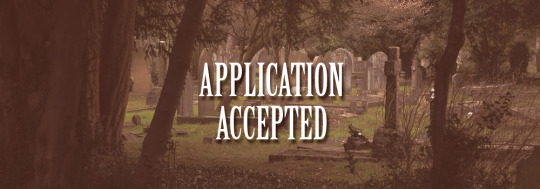
Welcome (back) to the Order of the Phoenix, Ky!
You have been accepted for the role of non-biography character ADONIS CARROWwith the faceclaim of Ben Barnes! We’re so excited to watch you explore the darker side of the game! We especially liked you explanations for Adonis’s motivations and beliefs, and how he’s fit himself into a world where by all rights he shouldn’t...yet does.
Please take a look at the new member checklist and send in your account within 24 hours! Thank you for joining the fight against Voldemort!
OUT OF CHARACTER:
NAME: Ky
AGE: 28
TIMEZONE: PST
ACTIVITY LEVEL: Daily-ish! I can’t predict my on call schedule, but I’m usually available by Discord for plotting, at least!
ANYTHING ELSE: Nothing you don’t already know!
CHARACTER DETAILS:
NAME: Adonis Carrow
AGE: 33
GENDER, PRONOUNS, and SEXUALITY: Cisgender male, he, bisexual
BLOOD STATUS: Pureblood? Halfblood? Who knows!
ORDER RANK: Affiliated
HOUSE ALUMNI: Slytherin
ANY CHANGES: N/A
CHARACTER BACKGROUND:
CONTENT WARNINGS FOR MENTIONS OF CHILD ABUSE AND DEATH.
PERSONALITY:
Charismatic, refined, perceptive, adaptable, and largely lacking such impediments as any sense of honour or loyalty, Adonis Carrow knows that nothing is forever. Not lineages, fortunes, masterworks, or wars. You only get so much in the world that’s actually yours. As such, the only thing he’s truly dedicated to is himself.
That’s not to say he’s cold. Far from it. He’s an artist, after all; not merely a liar, but a romantic one. Donnie knows how to pay attention, with such a warmth that it’s hard to resist basking in the glow. Is there always an ulterior motive, hiding behind that shine? Well, yes. He’d say so. (And the answer would never have a thing to do with loneliness. Not a thing.) It’s simply in his interests to entrench himself in as many corners of magical high society as possible. Networking, you know. Does that mean he doesn’t genuinely care about all those friendships and torrid dalliances and lingering affairs? No, no. At the very least, there’s base sentiments involved. Maybe some real fondness, even. The best lies have a bit of truth to them, don’t they? Just enough. Just enough that it wouldn’t hurt too terribly badly to cut it all loose the moment circumstances demand. That it won’t sting too much to remember that the most he’ll ever really be to these people is a taste of scandal - and the pitiable once-pureblood who tidies up their heirlooms.
In short, as much as he might enjoy their company or their bed, nobody’s likely to convince Donnie to rearrange his near-entirely selfish priorities. He’s not out to be a hero. He’s in it to survive, and thrive where he can. Donnie knows that’s he’s standing on dangerous, shifting ground, and he’s quick to adjust his footing when things start to slip one way or another. If he has to step on a few necks in the process, so be it.
BRIEF OVERVIEW OF FAMILY:
The Carrows were many things, back when they were anything; respected, feared, opulent, aspired to. Bearers of that fine, fine name sat the Wizengamot, riddled the Ministry, rose through the ranks of Aurors, had their professorial portraits hung on the walls of Hogwarts. Certainly, they had had their… missteps. Some say the family’s been as close to the Dark Arts as ivy to towers, ever since their far-flung beginnings. That might be a stretch, but it’s a matter of record, certainly, that several Carrows were interrogated at length in relation to their alleged involvement in the many crimes of Gellert Grindelwald. Nothing came of it, of course. In certain circles, their supposed nearness to such a notorious Dark wizard was quite the feather in their cap. Certain circles that continue to welcome them, despite their recent disgrace…
Yes, were, past tense. Now? Apolline stalks the mildewed halls of the family estate at the foot of the Cambrian Mountains, wrapped in her furious disdain and mouldering furs. Her eldest children, Amycus and Alecto - well, they’ve done nothing notable, have they? Except start a few ugly duels. And, apparently, take up service with the Dark Lord. Older than their baby brother by six years, and a difficult pregnancy, the twins had fallen from their parents’ good graces before they even arrived. When Adonis did, a beautiful boy with a beautiful name, cooed over and coddled and shown off as they never were, Amycus and Alecto found an easy target for their collective viciousness. They weren’t pranksters, to be clear. Bullies is hardly sufficient. The twins were torturers, dabbling in Unforgivables before they even wrote their O.W.L.S. - and testing them out, gleefully, on their baby brother. So long as their parents weren’t watching. Wouldn’t stand to see their favourite battered about, would they? Not when they had galas to dress him up for.
Apolline and Argus were never entirely sure where they’d went wrong with the twins. The derision and dismissal of their little childhood achievements? The unkind, constant comparisons? Who could say! An unpleasant feeling. So, they wholly neglected their oldest children, as much as possible - which was a great deal, when any wix would give their left arm to be so trusted by the Carrows as to nanny their apparent heirs. And so Adonis grew up with the benefit of the very best tutors and opportunities, and always striving to meet his parents’ exacting expectations - lest they change their minds, and abandon him to Alecto and Amycus.
He was doing rather a good job of it, it seemed, until everything came apart. Until the strength of their blood, the cornerstone of all they were and had, began to quake and crack. Until his father was found dead. Until his mother, never a sweet creature, soured in the face of owls unreturned and invitations dismissed. Until the twins became even quicker to lash out. At Adonis, most often. Now, Apolline didn’t stand in the way. They could fight for what remained of it all. Kill each other, if murder was what it came to. As her marriage had.
Adonis was out of that crumbling manor before his seventeenth birthday. He’s never been back; there’s nothing there for him, after all. The closest he’s come to his siblings is encouraging the Order to add them to that list of potential Death Eaters. Not that he had evidence, per se. But he wasn’t wrong, was he?
OCCUPATION: Appraiser/restorer of magical artifacts
ROLE WITHIN THE ORDER/THOUGHTS ABOUT THE ORDER:
It’s for spite, really. That’s what Donnie would insist, when it comes to his connection to the Order of the Phoenix. Spite, for the pureblood-mad society that cannibalized his family, that’s denied him the comfort and certainty and opportunities he was born for. If their Rome burns, he’ll take up the fucking fiddle for the occasion.
Too bad the Order’s rather less… fiery than he’d anticipated. He doesn’t enjoy the company of raving idealists, especially ones who, so far, seem rather bad at getting shit done. He’s also well aware that most of them don’t trust him, and doesn’t expect that to change; after all, what revolutionary bent on battling Dark sorcery would pick a Carrow to keep faith with? Everyone knows what Carrows are capable of. (Or think they do, anyway. Few know the half of it. Those grandparents who dallied with Grindelwald were hardly serving tea and hosting benefit balls.)
That’s not to say that his involvement should be seen as any sort of atonement on his family’s behalf. Goodness, no. There’s nothing of duty to any of this. Yes, it was a pleasure to see Professor McGonagall again, and he is rather fond of her, appreciative, genuinely, of her mentorship. But he doesn’t owe her, either. Or Dumbledore. Or any of them - these children, for the most part, out there playing partisan. Honestly, he thinks they’re woefully delusional. Too few. Too messy. Too hopelessly outmatched.
In fact, it’s rather risky of him to be helping them at all, and they should be bloody grateful, given that they’re certainly doing him no favours. The outcome of the war itself feels rather immaterial to Donnie; Carrows don’t matter anymore. He won’t be on anybody’s list, Ministry or Death Eater, at the end of all this. And if he doesn’t like how things evolve, from there, he’ll leave. Not as if there’s anything anchoring him where he is. There’s a whole world to see about, full of places (and people) he could settle into, all over again. His skills are, as they say, transferable.
Speaking of those skills. His professional capacities are occasionally of use to the Order, certainly; he’s a master of a niche craft, a field which demands mastery of transfiguration and cursebreaking both. However, it’s the inroads his career - and charms - provide that are most regularly valuable. Whether he’s quietly restoring the gables on the Greengrass summer estate or not-so-quietly seducing an Avery in some back room at the Ganymede, Donnie is well-positioned to notice things of interest to Dumbledore and his army. What, precisely, he passes their way really depends on his assessment. Is it believable? Can it be corroborated? Most importantly, is it likely to get him caught? His safety always comes first. But after that, sure - he’ll drop them a line, see what they make of his news. That’s about the extent of his involvement in the conflict, thus far. And honestly, he’s happy to keep it that way. He doubts the Order will win, but. He won’t lose, and he’s pleased to participate second-hand in the harassment and (ideally) destruction of Death Eaters. His brother and sister, specifically, if you don’t mind…
SURVIVAL:
Whether he’s delivering word to the inner circle or rubbing elbows (among other things) with Malfoys, Lestranges, Notts, and the like, Donnie is quick to assess the people around him, to gauge their values, to pick the right words and the best moments to smile and nod. Some might say he’s only so uncannily talented at all that fakery because he’s got no convictions of his own, nothing at all that matters to him. Untrue. It’s just that uncompromising ideals are an expensive thing to keep, and Donnie doesn’t have any he’s about to die for. Including the Order’s. Especially when they’re losing, which they unquestionably are. Disappointing, really.
When it comes to fight or flight, flight has always stood him in good stead - there wasn’t much else he could hope to do, as a child, facing the combined horror of the twins. This instinct became rather literal when he followed his precocious talents for transfiguration all the way to attempting to become an Animagus, and, with the help of Professor McGonagall, discovered his form to be a striking black barn owl. In truth, his Animagus is rather on the nose in several respects; growing up around the halls and manors of the Sacred Twenty-Eight, Donnie learned young that staying silent and listening to the whispers were vital survival skills for anyone who couldn’t - or wouldn’t - rely on wicked wandwork to attain all their ends.
RELATIONSHIPS:
Donnie does rather a lot of relating. Invitations to all manner of extravagant social events, from that disastrous Ministry masquerade to solstice banquets at so-and-so’s country house to the extravagant fêtes of magical London, land on his desk quite regularly. Who’s he to say no? It’s an honour. Hardly arduous, either - he was raised to weather waltzes and hours of idle small talk. Such a schedule creates ample opportunities to refresh and extend that intricate web of connections that keeps him in silk shirts and Châteauneuf-du-Pape - and, yes, information for the Order. He has quite the tangle of fascinating acquaintances and dear, dear friends out there in the darker, purer corners of British wizardry. The things you can overhear…
From the moment he left the ancestral manor, Donnie’s been sidling from bed to bed, castle to penthouse, making his way on the largesse of wealthy lovers. His string of secretive romances wind on; there’s moneyed dowagers and miserable husbands a-plenty who’d happily welcome him back, open-armed and pining. One might think this could lead to some awkward run-ins and jealousies, but the convenient thing about being untouchable is that nobody will admit to having had their hands on you. So, in a way, his secrets keep themselves from each other. Unsurprising, given that those wix all stand to lose so much more than he does.
In addition to the general stuff above, here’s a few specific connections (any with existing characters have been discussed with and cleared by their players).
ALECTO & AMYCUS CARROW
The twins. The monsters he grew up hiding from, when he could. While Donnie can see that the cruelty of his siblings was rooted deep in that of their parents, he’d also say that the point at which they couldn’t fairly be held responsible for the things they did to him passed a long, long time ago. That toxic favoritism wasn’t his fault, either. But what’s done is done, what they’ve become, they’ve become, and Donnie’s not about to forgive or forget. He was quick to add the twins to the Order’s list of near-certain Death Eaters, and, to be fair, he had concrete reason to believe they were - and he wasn’t wrong. Besides that, all he knows of them, these days, is second hand. It’s been a while; he hasn’t seen either Amycus or Alecto since he left the family estate, seventeen years ago. And he’s not about to go looking.
EMMA VANITY
A cousin of some degree - it all gets so tangled, in pureblood families - Emma is someone Donnie is aware of, but only distantly. They haven’t properly met, but travel the same circles. Just, you know, in different ways. And as different people than they used to be. Both are well-familiar with the best and worst of pureblood society, and, so far, at least, they’ve managed to survive it, even turn their place in the world into an asset - for themselves, and the Order. Not without cost. If they were ever to come across one another, they might find they have rather a lot to talk about…
AINSLEY ABBOTT
A professional acquaintance and something of a personal amusement. It’s just oddly entertaining to see Ainsley all aflutter over whatever antique he’s brought her way. And why would he do that, anyway? Well, see, Donnie’s busy. His genius is in the remaking of things, and that’s fine, finicky spellwork, tricky, challenging, fascinating. The story behind an object, the provenance? He doesn’t find all that especially interesting, honestly. That’s the chore of the job. One which Ainsley is ecstatic to do on his behalf, when called. Saves him time and trouble, so he’s happy to take the help.
EDGAR BONES
It’s not often that Donnie gets called in to sort out a whole bloody house, and for halfbloods, at that, but the money spends. It was Edgar who approached him with the job of seeing to the Bones place. Quite the task, but Donnie’s been enjoying himself - and that elder Bones, Rigby, and his husband - rather more than he’d expected. Lovely family. Shame about the baby and all that, but they deserve a bit of fun before decaying into domestic mediocrity, or whatever.
OOC EXPLORATION:
SHIPS/ANTI-SHIPS: I always run with chemistry. That’s it, that’s all!
WHAT PRIVILEGES AND BIASES DOES YOUR CHARACTER HAVE?
As a Carrow, Adonis was raised to be every bit a pureblood - privileges and prejudices included. People like him, like his family, were both the paragons and protectors of the best wizarding society had to offer, and rightfully in charge of shaping and governing the magical world. They had helped build it, and, obviously, had created something that would provide for them in return. Their wealth seemed endless, their social credit unlimited. Secure in every sense, the Carrows remained watchful, ever-ready to defend and shore up what they saw as theirs by right - and prepared to decry any possible stain on the society they’d tried to shape in their image. Muggles were a nasty nuisance, rather like rats, you know; plentiful and meaningless. Mudbloods? Repulsive. A sullying of magic itself. Halfbloods? Suspect, debased, common, not to be entrusted with anything too significant. Halfbreeds? Utterly vile, unnatural. The Carrows understood themselves, broadly, as part of a natural alliance of gracious stewards, the great and powerful and precious, standing against the meagre, weak, and mobbish. The Sacred Twenty-Eight existed to set a gloriously high standard, and maintain it, for the good of all of wizardkind. Nothing less would do.
The family’s messy, awfully public, and rather precipitous fall didn’t challenge those assumptions so much as render them fairly hollow, from Donnie’s perspective.
By the time he arrived at Hogwarts, his father was in the mausoleum and the rumors were at their thickest; school was no refuge from the scorn, and it certainly wasn’t just the purebloods of Slytherin house who participated. Halfbloods and muggleborns could be every bit as cruel, and, it seemed, enjoyed punching down just as much as any Flint or Bulstrode. Which meant that he would have to learn to take the hexes and hits - something he’d had too much of, growing up with the twins - or rise, somehow, at any cost. Amycus and Alecto had taken a third option, and brawled their way through the shame, incandescent with hate. Donnie rose. Even if those social scripts had turned on him, he still knew the plot, the roles. Could still play along, to get where he needed to go. Biting his tongue. Smiling at the spite. The price paid was nothing much, really. Integrity’s just a pretty word for putting other people and their principles and schemes before yourself and your own interests, isn’t it? Why would he ever do that? He can always pretend, anyway. That’s all it is. A game of pretend.
These days, Donnie’s playacting - and that pretty face - have won him a peculiar set of privileges. He can navigate the upper echelons of the wizarding world with ease, well-versed in its arcane etiquettes, close enough to power to hear its rumblings and bend ears, but comfortably far from any real responsibility, or the stifling expectations and strictures of being a proper member of high society. Rather liberating, in a sense. Limiting, in others.
Along the way, he’s developed a bizarrely practical perspective on the prejudices of his childhood and class. Donnie’s come to understand that few of the tenets he grew up knowing as givens truly are that. Call it sour grapes if you like, but… really, the whole notion of purebloodedness is just unsustainable, once you reach a certain point. And it’s rather apparent that the Sacred Twenty-Eight hit that a few centuries ago. So if the Order’s fighting a losing battle, so is Voldemort and his lot, aren’t they? Not to mention how many muggles there are, out there. He has to laugh at the notion that the Death Eaters could ever manage to rule much of anything, if that’s the idea. Those blood purists will breed themselves extinct, he figures, sooner than later. Magic will remain. All that ancient and noble shite will wither away, be sold off, melted down. Or wind up with him, perhaps. Delicious, isn’t it? The thought of such relics, the legacy of the high and mighty sorts he should have been, left in his hands. Dusted off and put on display in some chintzy gallery. Bought up to decorate the new muggleborn Minister’s office. Nobody giving a toss for their great, illustrious histories. Just pretty things. He’d enjoy that.
So… does that mean he’s any kind of egalitarian? Hardly. For the most part, Donnie enjoys paintings rather more than people. His formative years gave him no real reason to seek affection and affirmation from others. As for his regard for them, that’s largely dependent on how much you matter, as in, how useful you are to know. Beyond that, well - halfbreeds are simply disturbing, we can all agree. Squibs are miserable things, but he’s never been one to shed tears for strangers. Muggleborns are unfortunate, really, just… hamstrung, in terms of becoming as fully immersed in magical society as a wix ought to be. That’s hardly any concern of his, though. If they’re going to finally get on with it and guillotine some Gaunts and Fawleys or whatever, as those hysterical purebloods suspect, he’d be happy to sit back and enjoy the show. There’s halfbloods everywhere; any battle being waged against their ascendancy is long lost. Donnie isn’t bothered - he’s one of them now, apparently. Though, it does get tiresome, doesn’t it, when they get all up on their middling high horses, acting like the bearers of some new moral standard for wizardkind. Really.
If he truly despises anyone, with a proper passion, it’s those purebloods who are so entirely up their own arses as to presume that they’re better than him for being more reliably inbred. That, he fully acknowledges, is simply his share of the hereditary Carrow malice showing through. He’s been wronged, and he holds a grudge. At least he’s not delusional. Obviously, he’s not going to stop palling around with purebloodists. That wouldn’t be professionally feasible. Besides, there isn’t a swath of society that makes more sense to him than they do; he used to be them, after all. He was raised to withstand some odious company for the sake of appearances, so he can - for the sake of their galleons, now. And the occasional opportunity to cause some vexation through a well-placed whisper. Vicariously, of course. That’s what the Order’s for. He has paintings to finish.
WHAT ARE YOU MOST LOOKING FORWARD TO?
I guess I’m just excited to perpetrate a new character on all you lovely people, and explore some “ends” the group that I haven’t been able to yet! Seriously though, you’re all great.
PLOT DROP IDEAS (OPTIONAL)
Not exactly a drop so much as a connection, but I’m thinking it would be pretty neat and apropos for Donnie to have been involved in the mission to retrieve the orb from the Nott place - not directly, goodness no. Perhaps in tipping the Order off to the orb existing in the first place and where it would be? Or just appraising the orb they found, and determining it was a fake? Or both! Just a notion, seems like a natural way to tie him in.
Donnie also lends himself well to plots involving infiltration, theft, rumour-spreading, and distraction, and, obviously, anything related to magical artifacts. All pretty workable!
Maybe Donnie isn’t a true believer in the Order or its cause, and maybe he tends to see other people primarily as means to his ends, but… hey, he’s not entirely heartless. I’d be curious to see what might move him to take a more active role in the Order’s affairs, but I don’t at this point know what that might be. It’ll depend on the connections he makes!
ANYTHING ELSE? Not really!
EXTRA FOR NON-BIO CHARACTERS:
PAST:
Adonis was ten when the whispering began. His mother told the children not to mind such talk. That’s all it was. Baseless gossip that dared to imply that their pure, pure blood had been watered down by ambitious, filthy liars, that some branches of their sprawling family had not maintained their lineages so neatly as the others. The chatterings of jealousy; nothing, nothing at all, to a family that counted itself so loudly and proudly among the Sacred Twenty Eight. Nonsense. But that talk spread, and spread. Every rumour rang a little louder. The smiles at those galas took on a snide, superior glisten. Or, worse, to Apolline Carrow’s eyes - worse, those former friends and confidantes began to reek of pity. The sort that turned to laughter when you looked away. The snickers died when Argus Carrow did, suddenly, awfully. An error in his workshop, they said. Nobody looked to closely. Because nobody wanted to cross Apolline, even, perhaps especially, in the vicious throes of her house’s spiral into ruin. And, maybe most importantly… nobody much cared. The Carrows were respected, feared - not liked, by any means. If anything it was just another titillating chapter in an already sordid story. As for Adonis’ part in all that, well. His tale had never been so pretty as his face. He’d been the favoured son of a favoured family, and as the Carrows crumbled, so too had his parents’ doting affection, and with it, their willingness to protect him from his monstrous siblings. After Argus’ murder, Apolline and the twins burned through bridges and the fortune in vain, furious attempts to shore up what was theirs. By the time Adonis started at Hogwarts, he knew he couldn’t rely on much of anything - not his name, his blood, his money, his horror of a family. He’d have to make himself matter, on his own merits. Something a Carrow hadn’t had to do since the bloody middle ages.
PRESENT:
Thankfully, Donnie’s as talented as he is handsome. Which is saying something, isn’t it? His surpassing skills as a transfigurationist and cursebreaker, combined with his artistic gifts, led him quite naturally to a thoroughly respectable career in magical restoration. A prestigious career, given its intricacy. A career, nonetheless; something he’d never have needed to bother with, in the life that was taken from him. His days are comfortable, nonetheless, especially when ensconced in the generous arms of some new, wealthy darling or two. It’s still not much, coming from the opulence of the Sacred Twenty-Eight. But it’s far from the depths his family’s sunk to, and the life he has is his own. He’s even managed to charm his way back into those circles he was raised in, the circles of power, politics, and wealth. Perhaps there’s only so far he can go, now, only so much he can aspire to. That doesn’t mean he isn’t looking and listening for opportunities to reach higher, as he makes his way around those familiar parties and dinners. Which is how he found out old Professor McGonagall wanted to see him. Which turned out to mean that Albus Dumbledore wanted to see him. Which, it seems, meant that the Order of the Phoenix needed him. And, perhaps to his own surprise, Donnie… acquiesced, at least. Cautiously. It was the part about the Order being out to thwart themselves some Death Eaters that got to him. Thwarting pureblood fanatics, like his sister, his brother. That sounded rather promising. Not that he’d be out there flinging hexes in the streets. No, he’d be much more useful right where he was. Where he can notice things. Useful things. Whispers, as every Carrow knows from brutal experience, can unmake not only men, but dynasties. So you have to keep yours close, and those of your enemies, even closer. Which are the Order’s? Hard to say, sometimes…
FC CHOICES: Ben Barnes, Gaspard Ulliel, Harry Shum Jr.
1 note
·
View note
Text
Slackin’ with the Sleuth: reviewing Netflix’s “The Vile Village”

After two sluggish double-episodes, we are now headed to the three best two-parters of the second season, nay, of the entire show until now. Today, we’re going to talk about direction. “A Series of Unfortunate Events” has suffered not only from being overwritten, but also from being under-directed. Not an unfortunate consequence of the original writer being involved in the production of the television series, but rather of the other writers not controlling him enough. Episodes written by Daniel Handler get a bad rep amongst the fandom, but from their structure it’s pretty clear that he was more than willing to change his own outlines and listen to the contributions of other people. That being said, it’s hard to criticize the guy who came up with the work you’re supposed to adapt. Which is why episodes written by other people and peer-reviewed by Handler tend to fare better, as his role is to remind everyone of what made the story so successful in the first place.
We’ll see how this contributed to the improvement in direction in the latter half of Season 2. Most of it comes from the production team finally treating the series not only as an adaptation, but also as its own cinematic work. Let’s determine why below the cut.
DISCLAIMER (NOTHING TO DO WITH THE REVIEW):
I missed you guys, it’s been a while.
I apologize for abandoning the blog for so long, to the point that some of you people started worrying about me. I do appreciate the concern, so thank you. Most of my absence can simply be explained away by the many hours I’ve had to put into my day job. This has led to difficult choices regarding my hobbies and extra-work activities, writing for this blog being one of them. Truth be told, I don’t feel this blog fulfils as interesting a purpose as it did before. I’ve already talked about most book theories I cared about, and the books have been discussed to death at that point. As to other types of analyses, there are plenty of talented people on Tumblr who do it as well as me, so I didn’t feel the need to add much to the debate. But I’ve had time to think about plenty of Snicket-related topics during my absence, so no, the blog isn’t dead, just… much less active as it was a few years back. Stay tuned for more, my love for the books and their associated material is very much alive and kicking.
With all due respect (and affection) for our community, your duly devoted Sleuth.
This is the most atmospheric episode to date, and a beautiful one at that. While episodes of the first season certainly had their ambiance, most of it came from the introduction of new musical themes. The second season tries to bring the direction to the next level by fashioning each double-episode after a certain genre, which influences the entire aesthetic of the piece from its writing, colors and camera work. This is perfectly in line with the tone of the original series: each book focuses on a vivid and peculiar location which becomes a character in and of itself, and also parodies specific literary tropes. In keeping with this tradition, the televised version of “The Austere Academy” mocks coming-of-age teen movies, “The Erstaz Elevator” has shades of musical romantic comedies from Hollywood’s Golden Age, “The Vile Village” pays homage to Westerns, “The Hostile Hospital” is a straight-up horror exploitation flick and “The Carnivorous Carnival” is a neo-expressionist drama. Or rather that’s what we were supposed to infer. In reality, “The Austere Academy” and “The Erstaz Elevator” don’t have anything special in terms of direction to truly allude to their models, and while “The Carnivorous Carnivale” is a blatant remake of “Freaks”, so was the book in the first place. Only with “The Vile Village” and “The Hostile Hospital” do we see the direction add a substantial commentary on the original aesthetic of their respective book. So while the intention is laudable, the execution is somewhat lacking as far as the entire season is concerned. More on that in the next review.
But for now let’s just gush over the gorgeous visuals of “The Vile Village”. Westerns describe the struggle of civilization in a lawless territory, a perfect setting for the crux of a book concerned with legality and mob psychology. While the introduction of the Nevermore tree leaves something to be desired, we do eventually get some fantastic shots. The integration of the CGI and the digital matte paintings significantly improves from this episode on, although whether the artificiality of previous episodes was an intentional choice from the directors is anyone’s guess. The scene of Hector’s first flight aboard the self-sustaining mobile home is a work of beauty. One must regret his line about crows being too “scary”, though. Not only is this an unnecessary change to his character (he is fascinated by the crows in the book), it doesn’t even make sense as the adaptation does not portray Hector as being scared of crows in any shape or form otherwise. He actually has a line about admiring them in the first part of the episode! What on Earth were the writers thinking?
The feels of Western movies is well-rendered, with an impressive focus or lighting. What the director seems to have forgotten is how dusty the Village of Fowl Devotees should look. This is pretty unforgivable given that the book insists on the unbearable feeling of dirtiness which permeates the town. There’s an egregious continuity error where the Baudelaire orphans escape from prison in a massive cloud of debris… then come into the next shot with immaculate clothing. This is a major sin as far as immersion goes.
Another blatant directorial choice is the tendency to film scenes across a two-dimensional space, with characters moving from one side of the screen to the next. This ever-present horizontal axis gives the series a somewhat stiff aspect, with characters not being able to express themselves in a dynamic body language in action scene. There are two possible reasons for this camerawork. Firstly, it makes certain scenes easier to follow (we must not forget that the series is expected to remain watchable for small children), although a little boring on the visual side. Secondly, it does imitate the format of a theater stage, and the theater world plays an important role in Snicket’s world, from “The Marvelous Marriage” to “La Forza del Destino”. I do think the showrunners went a little too far in this direction, though. If they’re so deadest on reproducing the feel of a theater production, maybe they should just pitch the series as a Broadway show rather than a television series. The chase sequences in this double-episode look more like a Street Fighter screen than a cinematic production.
But by far the greatest contribution of this episode is the merciful introduction of SILENCE. What a relief to hear the godforsaken concertina shut up for one minute and let us enjoy the dialogue! The heart of the double-episode comes from the back-and-forth dynamic between Jacques and Olaf (or, to a lesser extent, Esmé and Olivia). Truly a battle between blind, hopeful idealism and cynical nihilism. Major props to Nathan Fillion, who remains possibly the best actor in the entire series, and Neil Patrick Harris who should ruin the seriousness of the scenes with his constant bebopping but somehow doesn’t.
This however comes as the expanse of the Baudelaire orphans themselves, whose presence is somewhat secondary in this episode. The symbolism of them escaping the town in a fire truck is a strike of genius… but the Isadora couplet subplot is drastically skipped over and the unnecessary introduction of Mr Poe drastically reduces their screentime. It’s more forgivable than in “The Erstaz Elevator” as most scenes between the adult characters do help move the plot forward and provide interesting information, but it’s still one of our major criticisms for this season. The writers are clearly infatuated with the adult actors, which hurts the pacing of the story. It’s a shame as the child actors’ acting shows major improvements in the second season. Louis Hynes comes into his own in the prison scene, but the breakneck speed of the scene’s direction does not leave him enough room to grow. We will however concede that Jacquelyn and Larry don’t overstay their welcome in this episode, and that Jacques and Olivia’s romance is sweet to look at. While we disagree with the changes made to Olivia’s character on the whole (we’ll get to that in my review of “The Carnivorous Carnival”), it did produce some well-written, well-acted scenes. Less appreciated is the unnecessary and overstated introduction of a Violet/Duncan romance subplot… this is what happens when you base 90% of an adaptation on what admittedly amounts to fan-pandering. It’s sweet, then it’s sweeter, then you’ve got diabetes.
As far as character development goes, it’s pretty hit-or-miss. Esmé is as usual fantastic. The writers have managed to attain a difficult equilibrium regarding her character dynamic: she obeys enough not to overshadow him, but she also acts as her own antagonist, pursuing her own goals and betraying him if the need arises. The rest of the troupe also has an interesting dynamic with her and her integration in the crime family feels pretty seamless.
But so far we’ve saved the worst for the last paragraph, and as you’ve probably guessed, we’re going to have to speak about Hector. Gods almighty, what a waste of a perfectly good character. Josephine’s death was shot in a very disrespectful manner, but at least her character remained mostly the same. Here the Hector from the books, a tragic and heartbreaking portrayal of peer pressure and social anxiety, is reduced to a joke. To add insult to injury, it’s not even a funny joke: his constant fainting gets tedious quickly. And the ultimate twist about his mom’s fate not being the source of his trauma after all basically reduces his arc to a complete waste of the viewer’s time. If the writers hated him so much, why not just cut his screen time instead of demeaning his entire existence? This does not bode well for a potential adaptation of “All The Wrong Questions”, as Hector’s outlook on family loyalty and peer pressure is somewhat of a plot point in this series. I truly cannot begin to understand these choices as Hector plays a similar role to Hal, Charles and Jerome, who also have likewise personalities… but the writers have adapted Hal, Charles and Jerome faithfully and cleverly, so what gives?
#0542#Lemony Snicket#ASoUE#a series of unfortunate events#review#daniel handler#Sunny Baudelaire#klaus baudelaire#violet baudelaire#Hector#esme squalor#count olaf#Arthur Poe#jacques snicket#neil patrick harris#nathan fillion#asoue netflix
113 notes
·
View notes
Text
Top 5 Hair Regrowth Oil | Pkshop.pk
We'll go more top to bottom about oils and their job in developing hair somewhat later in this article. Be that as it may, for the time being, we should show a portion of the oils that have been demonstrated to furnish with hair development.
Castor oil
Castor oil is wealthy in omega-6 unsaturated fats that help quicken hair development, among numerous different advantages. Castor oil, so, contains characteristic exacerbates that advance hair development and contains Ricinoleic corrosive, a basic amino corrosive required by the body.
Remember that there are three kinds of castor oil utilized for hair care: natural castor oil, Jamaican dark castor oil, and hydrogenated castor oil. We'll investigate every assortment later.
Jojoba oil
Jojoba oil contains an omega-9 unsaturated fat that impersonates human sebum (the normal oils created by skin).
Rosemary oil
Rosemary oil expands the cell digestion in hair follicles to animate hair development.
Tea Tree fundamental oil
Tea Tree improves scalp and hair wellbeing in an assortment of ways, including that it goes about as an antimicrobial and antifungal specialist.
Argan oil
Argan oil has numerous advantages and is incredible for individuals with dry or bunched up hair.
5 Best Oils for Hair Growth and Thickness (Men and Women) Domen Hrovatin July 16, 2019 Hair Growth and Hair Loss Treatment, Reviews 4 Comments
Beat hair development oil
Ceasing male pattern baldness is a genuine business, particularly when you think about that it's one of the most widely recognized issues related with generally hair care. There's a huge amount of items accessible that address the issue of male pattern baldness and hair development, including oils.
Our activity in this post is to investigate oils and their consequences for hair development, including what we believe is the best oil for hair development – Natural Growth Hair Oil With Caffeine .
We'll look at some hair oil purchasing tips, take a gander at the most significant fixings in hair oil, and discussion a little about how to apply it.
Coconut oil
Coconut keeps your scalp sound and is useful for all hair types.
Baobab oil
Maybe not also known as different oils, baobab oil has earned some publicity as a hair development trigger. For one, it has a high nutrient substance, including nutrients A, D, E, F, which work together to improve the flexibility of your hair.
Peppermint oil
Peppermint oil has likewise been appeared to advance hair development.
2. HAIR TYPE
On the off chance that your hair slick, dry, or "typical." It's critical to coordinate your hair development oil with your kind of hair.
3. Saturating
A decent hair development oil ought to have saturating characteristics that feed both hair and skin.
4. Regular INGREDIENTS
Stay away from cruel substance added substances and manufactured fixings at whatever point conceivable. They may harm hair and cause antagonistic skin and scalp responses.
5. Flexibility
Numerous hair development oils serve an assortment of capacities and may have different uses, for example, a chemical for the face, for generally skin wellbeing, and so on. While it is anything but a need when picking the hair development oil you believe is best for you, flexibility is useful.
Next, how about we proceed onward to the best oil for hair development.
Top 5 Hair Growth Oil
1. NATURAL GROWTH HAIR OIL WITH CAFFEINE

Caffeine, you inquire? Truly, caffeine – yet not in a similar structure that helps give you a kick-begin every morning.
Caffeine, in white powder structure, is utilized in oils (for whiskers and hair) to enter and invigorate hair roots. Also, it works for the two people. As a result, caffeine squares DHT that harms hair follicles and is halfway in charge of male example hairlessness.
Which raises to Essy's Natural Growth Hair Oil. For one, it's imbued with caffeine, yet additionally incorporates the majority of the nutrients, supplements, and cancer prevention agents that animate longer and quicker hair development – including castor oil and biotin.
Not exclusively does Natural Hair Growth Oil advance hair development, however it additionally makes diminishing hair thicker, fixes split finishes, and even causes your hair to have a shinier look. You'll additionally like how it makes your hair feel smoother and more grounded.
Normal Growth Hair Oil is non-paraben, non-sulfate, non-gluten, and its delicate equation isn't excessively unforgiving on hair follicles.
It additionally accompanies a 100% unconditional promise. In case you're not fulfilled, send it back for a full discount.
Masters
1. Fixes and regrows hair
2. Characteristic fixings
3. Delicate enough to utilize around four times each week
CONS
1. May feel greasier than different oils
2. PURA D’OR CASTOR OIL

Getting thicker, more full eyelashes implies, to a limited extent, keeping them appropriately saturated. Lashes can end up got dried out, much the same as the hair on your head and your skin.
Pura D'Or has you secured because of its 100% Castor Oil item, a great answer for keeping your eyebrows and lashes well-saturated. It additionally makes longer, increasingly tasty lashes.
The key fixing, as the name proposes, is common castor oil. The last has numerous regular properties, incorporating that it's high in nutrient E, minerals, proteins, and Omega-6 and other gainful unsaturated fats. Pura D'Or utilizes the chilly squeezed technique for removing its castor oil, which means less of its advantages are lost during the procedure.
Another of castor oil's numerous pluses is that it's commonly protected (and simple) to utilize. Pura D'Or's castor oil accompanies a mascara wand and in a jug to make it easy to apply anyplace, regardless of whether you're at home or in a hurry.
Castor oil has numerous different uses and advantages, including that it very well may be mixed with different oils or fixings to enable hair to become thicker. It can likewise help reduce dandruff. Other key fixings in the Pura D'Or Castor Oil are argan oil, rosehip oil, and nutrient C serum.
It additionally has a satisfying, alleviating fragrance that is discernible however gentle.
You'll additionally welcome that Pura D'Or's Castor Oil accompanies a 100% one-year unconditional promise. On the off chance that you return it inside 365 days, you'll get a full discount.
Geniuses
1. Saturates dry skin and hair
2. Simple to apply anyplace
3. Alleviating fragrance
CONS
· Somewhat heavier than certain individuals like
Main concern
Pura D'Or consolidates the numerous advantages of castor oil with other common fixings to make an item that enables clients to get thicker, more full, and well-hydrated lashes.
3. VIVA NATURALS ORGANIC JOJOBA OIL

Viva Naturals Organic Jojoba Oil is another multi-reason item that is extraordinary for sound hair and hair development. For this situation, it's about the dampness and Viva Naturals' oil keeps your hair hydrated to shield it from getting to be feeble and fragile.
There are a lot of motivations to like this oil, including that it contains no added substances and additives, has USDA endorsement, and is scent and hexane free. In any case, there's additional, including that you can utilize it for healthy skin on the grounds that, once more, it's an incredible cream.
It's additionally chilly squeezed rather than refined from cruel synthetics. Cold squeezing keeps the fundamental unsaturated fats in and jam the oil's general virtue.
Viva Naturals gets its oil from the seeds of the jojoba bush and, gratitude to its refining forms, keeps it in its most flawless, most characteristic structure.
While you can utilize Viva Naturals Organic Jojoba Oil alone – and it arrives in a simple to-utilize siphon shower bottle – you can likewise join it with your preferred hair care item to take dampness back to your hair while keeping it from getting to be dry and fragile.
Masters
1. Gives fundamental dampness to your hair and scalp
2. Multi-reason
3. Natural fixings
CONS
1. A few purchasers favor a dropper tool instead of a splash siphon
Main concern
Viva Organics Organic Jojoba Oil positions among the best hair development oil for a lot of reasons, including that it rejuvenates and feed hair while advancing hair development. It additionally saturates your hair.
4. JACK BLACK EPIC MOISTURE MP 10 NOURISHING OIL

Jack Black's Epic Moisture Nourishing Oil is another performing multiple tasks oil with advantages for hair development and skin wellbeing. You can likewise utilize it as a molding, styling, or completing apparatus for your hair.
The key fixing in MP 10 is argan oil and, in mix with plum seed, jojoba oil, and olive oil it attempts to decrease crimpedness while improving your hair smoothness and sparkle.
The "10" in Epic Moisture's name represents 10 characteristic oils that give dampness, cancer prevention agents, fundamental supplements, and unsaturated fats to your hair and skin. Among different fixings are watermelon seed oil, which supports and reestablishes skin and hair, and baobab seed oil, which restores and fix skin, including your scalp.
What you won't discover in Epic Moisture MP 10 are parabens, colorants, or liquor, while the majority of its fixings are ensured natural (just as dermatologist-tried).
So far as that is concerned, you can likewise utilize MP 10 for shaving, either for pre-shave arrangement or as an independent shaving oil, since it saturates and alleviates skin. Or on the other hand, you can utilize it as a conditioner and prepping help for your whiskers or mustache.
Situated in Carrollton, Texas, Jack Black is a major player on the men's prepping items scene with a wide scope of value items to back up its outstanding notoriety.
Aces
1. Lightweight surface
2. Gives magnificent hydration
3. Different employments
CONS
1. Some state the oil is excessively flimsy
Primary concern
Jack Black's Epic Moisture MP 10 works superbly of hydrating your hair to keep it sound and developing. While it might be more costly than certain items, you get what you pay for this situation.
5. BADGER MEN’S HAIR OIL

Only one out of every odd man spends most of his day inside, which is significant for hair wellbeing in light of the fact that the components, including the sun, may dry out your hair and make it somewhat fragile.
While Badger Men's Oil isn't just for men who work and play in nature, it helps fortify hair and ensure against the sun, wind, chilly climate, or whatever else Mother Nature needs to toss at you.
We like it for a ton of reasons and it's not hard to like Badger's items as a rule. Situated in the "timberlands" of Gilsum, New Hampshire, Badger has earned its spot among the best creators of men's preparing items and is known for its natural fixings and exclusive expectations of farming and generation.
There's nothing excessively confused about the Badger Men's Hair Oil recipe since it's a blend of natural, astounding plant oils, fundamental oils, basic unsaturated fats, and nutrient E. It additionally incorporates nutrients A, D, and F.
In any case, it completes a great deal for your hair, including that it reestablishes your hair's regular radiance and versatility while improving its sparkle and reasonability. To put it plainly, you'll appreciate improved hair and scalp wellbeing, which makes it simpler to develop the sort of thick, more full hair that you want.
Among other natural fixings, you'll find in Badger Hair Oil are jojoba oil, sandalwood oil, dark pepper organic product oil, and sunflower seed oil. It additionally incorporates menthol gems which help revive and invigorate the scalp.
Besides, Badger Men's Hair Oil smells wonderful, however not in an overwhelming manner.
Aces
1. Natural
2. Ensures against the components
3. Menthol cools and revives the scalp
CONS
1. Doesn't give much hold, if that is imperative to you
Primary concern
The majority of Badger's items are natural and don't have unsafe symptoms. Consolidate that with a pleasant blend of regular fixings and legitimate consideration taken during the assembling procedure, and you end up with an oil that is useful for your hair and its development.
1 note
·
View note
Photo




👉1ST-have a look at how #Jews, very fastidiously, forged a #reparations agreement w/state of @Germany after #WWII. CLICK HERE #ADOS #itcanbeDONE #comeuppance #tyranny #restitution #atrocities @tariqnasheed @NLIsrael @drboycewatkins1
In the autumn of 1949, with the foundation of the Federal Republic of Germany in the area occupied by the western Allied Powers, the nascent German state still lacked complete sovereignty in every realm. The laws of occupation were still valid and canceling them depended on a variety of political and financial arrangements. One of the conditions for complete German sovereignty pertained to the reparations to be paid to Holocaust victims. In principle, the political leadership of the State of Israel was interested in receiving reparations from Germany, but initially, was unprepared to enter into direct negotiations with German representatives. The Western Allied Powers for their part refused to demand reparations from Germany on Israel’s behalf, forcing both sides to sit around the negotiating table. Eventually, negotiations began in early 1952, in the city of The Hague, Holland.
The discussions between the two delegations were not easy. This was not surprising in light of the difficult topic and the fact that only seven years had passed since the liberation of the concentration camps and the end of WWII. Most of the population in West Germany opposed the reparations. The German public mainly was against the large sum that Chancellor Adenauer was prepared to accept as a starting point of the negotiations, some four billion German marks. However, Adenauer understood well that there was no alternative to reaching a compromise with the Israeli side, in order to restore West Germany to its proper standing among the nations of the world. In contrast, every claim against the East German government remained unanswered since the Communist regime, which obeyed instructions from Moscow, never recognized the responsibility of the entire German people for the Holocaust and the atrocities committed in its name until 1945. The discussions between the two delegations were not easy. This was not surprising in light of the difficult topic and the fact that only seven years had passed since the liberation of the concentration camps and the end of WWII. Most of the population in West Germany opposed the reparations. The German public mainly was against the large sum that Chancellor Adenauer was prepared to accept as a starting point of the negotiations, some four billion German marks. However, Adenauer understood well that there was no alternative to reaching a compromise with the Israeli side, in order to restore West Germany to its proper standing among the nations of the world. In contrast, every claim against the East German government remained unanswered since the Communist regime, which obeyed instructions from Moscow, never recognized the responsibility of the entire German people for the Holocaust and the atrocities committed in its name until 1945. Even before the negotiation between representatives of both countries (Felix Shinnar from the Israeli side and Franz Böhm from the German side) claims were submitted against formal entities in Germany. The claims were submitted at the level of various states within Germany that later comprised the Federal Republic – but there was no overarching German arrangement with clear objectives and sums. The negotiations between the countries were long and difficult. Many discussions were held, some of which conducted under a veil of secrecy out of fear that the representatives would be physically harmed. In May 1952, a serious crisis occurred, and the sides left the discussions following a heated debate regarding the amount to be paid as reparation. Ultimately, towards the end of 1952, the representatives – among them, the President of the World Jewish Congress, Nahum Goldmann – reached an agreement. According to the agreement, West Germany committed to supply the State of Israel with goods and services valuing 3.5 billion marks over a period of 12 years. Part of the agreement was the German assurance to enable personal reparations too, as well as the return of property to its legal owners. In order to follow through on this agenda, an additional sum of 450 million marks was promised. Not only did many German citizens have reservations about the agreement-in-process. Considerable portions of the Israeli public were also unprepared to accept neither the very concept of negotiations with Germany nor the funds from the “land of the murderers,” which was defined by opponents as “blood money.” Menachem Begin led the struggle against the agreement and against David Ben Gurion’s basic policy, which for years promoted rapprochement between Israel and West Germany. In the spring of 1952, when the negotiations between the two parties was already underway, Begin gave speeches at mass demonstrations organized against the reparations. Demonstrators included many Holocaust victims who had not come to terms with the contact between the Jewish State and the Germans, who only seven years earlier had been part of the Third Reich, the embodiment of evil in modern Jewish history. The short period of time since the Holocaust, the profound shock experienced by the Jewish public on discovering its extent and results, and the signs of Germany's quick rebound to the community of legitimate nations, aroused strong feelings and caused an uproar among the Jews in Israel and around the world. The thought that those who just yesterday had been the worst murderers of the Jews would today pay monetary compensation for an unforgivable crime was for many an intolerable prospect. A certain opposition arose also to the idea that the young State of Israel was taking on itself to represent the Jews as a whole and was agreeing in their name to accept monetary compensation from the Germans. The matter was so sensitive that the state authorities preferred to speak of “reparations,” relying on a little used Hebrew term, shilumim, which stresses payment and avoids describing the nature of the payment. The term replaced the problematic concept of “compensation,” in order to avoid creating the impression that the state believed that it was possible to compensate survivors and offspring of the victims for what the Nazis had done to them. On September 10, 1952, the representatives signed the agreement. The signing took place at a neutral location: at the town hall of Luxembourg. Moshe Sharett, as the Israeli Foreign Minister, Nahum Goldmann, representing the Jewish Agency, and Konrad Adenauer, as presiding Foreign Minister (together with his role as Chancellor of the Federal Republic). Today, most historians agree that it is thanks to Adenauer that the agreement received political support in Germany, support which had not existed during the various stages of contacts made to pave the way to the agreement. His sincere understanding that there was no doubt regarding the responsibility of modern Germany for Nazi crimes shaped one of the basic guidelines of German policy to this day. Indeed, Germany’s recognition of its responsibility for Nazi crimes and the special relationship with the State of Israel rooted in it are foundation stones in the relations between two countries, regardless of the makeup of the governments of Germany and Israel. As part of the reparations, many goods reached Israel which helped the state economy to stabilize over the years. For example, Israel received new-fangled German-manufactured trains, which were operated for a number of years by the Israel Railways. However, it quickly became apparent that the delicate motors could not withstand the climatic conditions of the Middle East, so that the trains were removed from service. Some of the cars enjoyed a surprising second career: one was donated to the medical non-profit “Yad Sarah,” and served as the organization's office in Jerusalem. Another car serves today as a home for the “HaKaron” ["the train-car"] puppet theater, located in the Liberty Bell Garden in Jerusalem
1 note
·
View note
Text
The Commodification and Consumption of Violence and how it Alters our Views on Fictional Violence
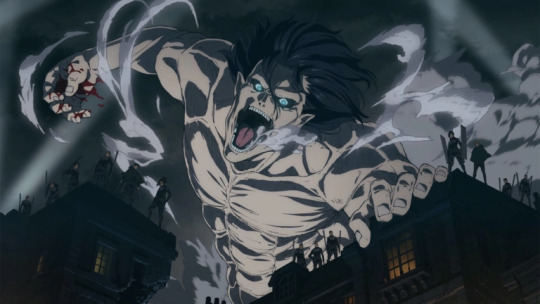
trigger warning: death, blood, gore, suicide, violence
The presentation of violence in the media has a definitive influence on the opinions that we formulate concerning characters, of which they are either victims or perpetrators, and how people perceive the overall story. The violence displayed is often left to the viewer to interpret and to compartmentalize their emotions in regards to the scene. Furthermore, it is left in the hands of the viewer to discern their reactions based on the actions portrayed.
Framing the Situation
Media frames violence within certain contexts in the narrative and characterization of a story and that provides fans with an avenue to condemn or justify the actions. As well, violence can be produced and have its interpretations be dependent on external factors created by the humans.
For example, the framing of this scene:

Within the context of the story, the violence depicted in this manner is both horrific and terrifying to the reader, especially as the reader grapples with the scenes prior being just as blunt and brutal in its depiction. However, the ways in which people are made to interpret this scene within the story set the tone for the way in which they react towards the violence against the aggressor and against the persecuted.
While the violence is horrifying, the ways in which it is packaged within the story, and thereby made consumable, alters the judgement of readers. It makes them sympathize with those who escaped the violence, but feel that the persecutor was deserving of his “punishment”, despite its horrific means.
Compared to these panels:
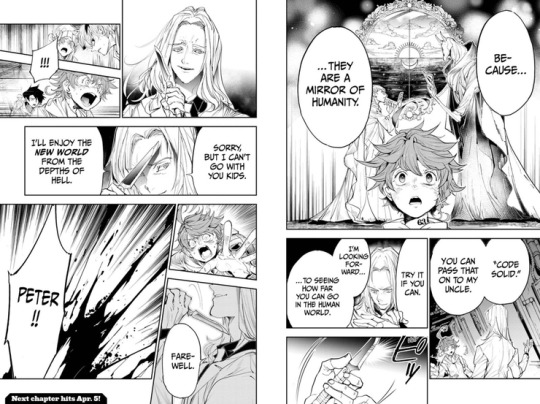
The framing of the violence is presented in a way that the viewer no longer feels vengeful or that the aggressor was deserving of his judgement.
This scene is framed in a way that the viewer feels pity and to some extent understanding towards the antagonist. The means of presenting this scene are done so in a way that the reader can understand and relate to the nihilistic view of the character, thereby creating a mode of justification for his legacy, actions, and ultimately the death he receives.
The contrast in depictions of violence within both scenes creates two alternative framings of violence which can redirect the audiences feelings towards the violence being perpetuated.
Our empathy is only extended as far as to one party, which relays that the ways in which violence is portrayed affects the means by which fans react to it when it occurs against certain characters under specific circumstances. In spite of the violence committed by each of the characters, the structure of the story allowed for readers to regard both violent deaths in different views.
The Biased Eye
The formation of a bias within the media creates a barrier and acts as a preventative measure through which criticisms are unreached and the acts of a character are either understandable or reprehensible.
In the clips of the character, the viewer is made to understand that the acts that the character has committed are vile, and that she may even be viewed as evil. However, by creating a character with an aesthetic and “cute” appeal to her, it creates a deterrent for people to properly judge her actions. If anything, it serves as a muddler on people’s moral compass. The aesthetic of the character in contrast to her actions is difficult to take in because she does not fit into the stereotype of an “ugly” and “wretched” looking villain, thereby clouding people’s perception of the character in tune with her acts.
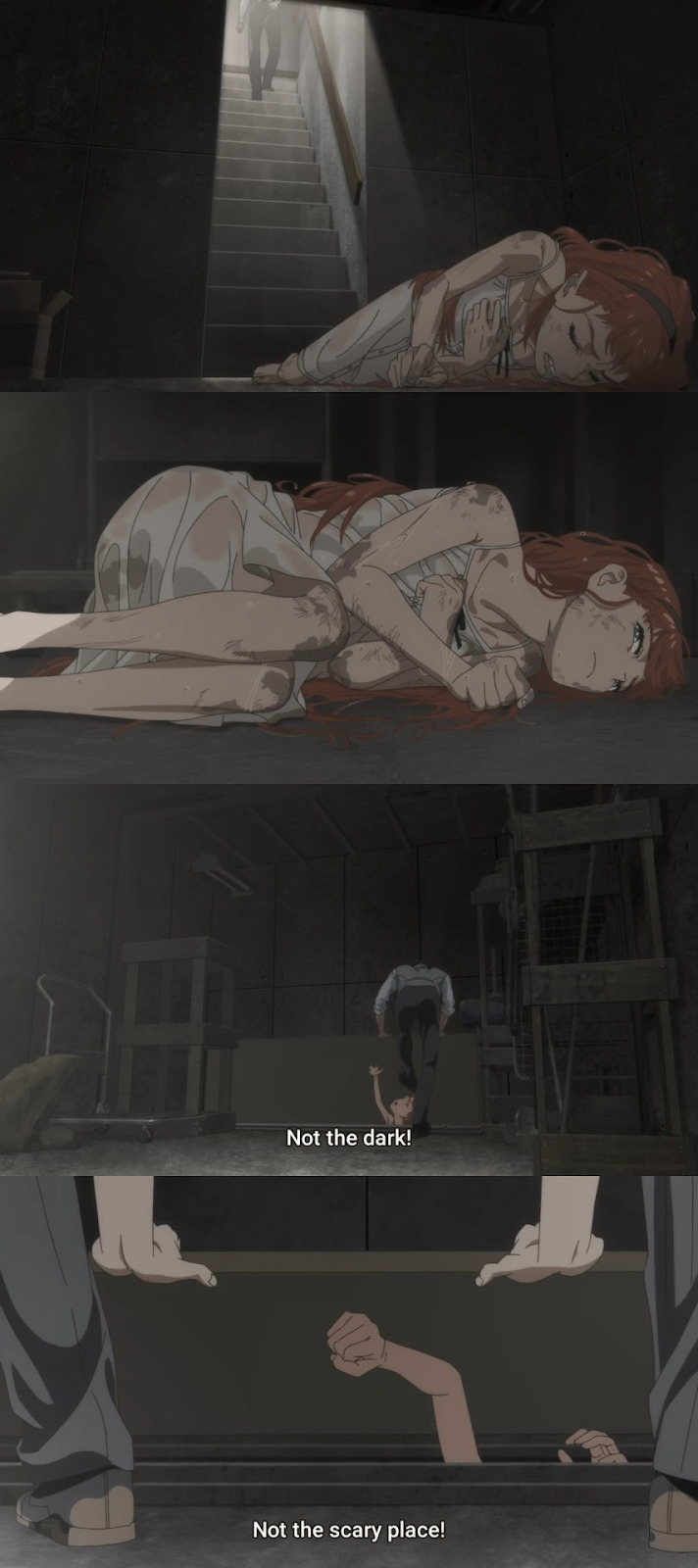
Another form of bias towards the character is visible in this scene. While the viewer understands that the girl has committed murder and that she has hurt the people around her, the way she is depicted as being hurt and thrown out by her "father-figure" create pockets of sympathy and understanding which can eventually evolve into justification. As well, the background of this character makes her almost relatable enough that people can even see themselves within her and relate to the pain that she experiences. With an understanding of the character, their actions thus also become understandable and therefore lead people to legitimize their actions.
The biases that people create around characters despite their violent actions creates a moral ambiguity within the viewer. Therefore, they are able to skew the scene to fit a narrative they have constructed around the violence that takes place.
Primitive Curiosity
Another pushing factor in the formation of opinions on violence against fictional characters is the primal curiosity that inhabits a portion of people’s minds. While people are civilized beyond acting out on primal urges, nonetheless, there is still a part of the mind that finds curiosity within the brutal and grotesque.
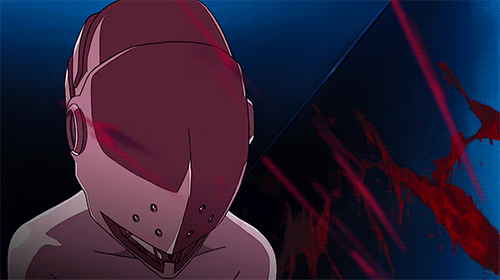
In this anime, gore plays a central element to the story that is being depicted. The brutalities of the deaths shown are sickening and remind the viewers that the character causing the destruction is not human. While viewers are naturally unnerved by the violence depicted, there is still a small part of them that is intrigued or even entertained by the violence. People may automatically react with disgust towards the violence enacted, but they may also feel curious enough to dismiss the actions of the character in order to continue viewing the ravaging that is being committed.
youtube
The scene depicted in this anime is vicious and bloodthirsty. The theme of war and its fatalities are graphically depicted as viewers consume scenes with ferocious violence and bloodshed. The initial reaction to the scene depicted is one of shock and horror that evolves into inklings of excitement. As the initial shock of the scene dissolves, the viewer then becomes involved with the extreme nature of the scene and begins to view it with pleasure or amusement. While the acts of war are inadmissible, people may become caught up in the viciousness in the battle that it becomes about the adrenaline of the scene rather than the ruthlessness of violence.
Human morality pushes primal curiosity into furthest recesses of the mind, however that does not permanently banish it from existence. People may find relief from this curiosity through the violent nature of the media. The excitement that this media arouses in people thus clouds their judgement and ability to appropriately address the violence being portrayed. Primal curiosity acts as a buffer to the judgement of violence depicted on screen.
Conclusion
There are many factors that push or pull people from acceptance or denial of violence that is depicted on screen. People consume media at high rates and thereby formulate opinions based on a vapid viewing of the media they watched. There are many reasons that people may agree or disagree with the acts of violence depicted, and the primary influences are the ways in which violence is packaged and consumed. How people view media and how it is presented to them thereby frames the narrative they construct around the violence they consume. Violence becoming an easily accessible commodity has constructed a warped and distorted perspective that allows for the acts of violence perpetrated in fiction to be debated and examined as deserved, justified, and understandable or as unforgivable, menacing, and atrocious. The state in which violence is viewed and interpreted creates amongst people a means to decide how they view the violence portrayed and how they wish to address it.
0 notes
Text
BECAUSE I’M NOT POPULAR, I’LL READ WATAMOTE: CHAPTER #121
You know, I really should stop assuming that the next chapter is going to be the start of Tomoko’s third year, otherwise I’m gonna start looking like one of those pretentious fans who thinks they know the manga better than the creators.
So after last chapter’s emotional rollercoaster, we follow Tomoko into her spring break where she goes...fishing. Now, I wasn’t expecting a “filler” chapter before Tomoko’s third year, but I can’t complain. We needed a funny, breather chapter of sorts after what went down at the party. I could see other series making a chapter like this and being painfully obvious that they’re dragging the story out, but in Watamote, no chapter is completely devoid of substance. Whether it’s dick pics or fishing, Tomoko will make it entertaining.
Chapter 121: Because I’m Not Popular, I’ll Spent Time with my Dad
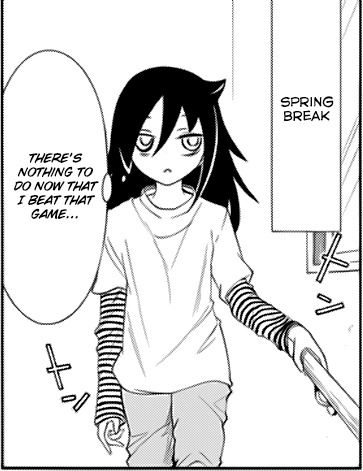
Maybe I’m reading a little too much into it, but I do notice a minor difference in Tomoko’s behavior for how she spends her school breaks. Back in her first year, Tomoko would despair about wasting time doing her otaku hobbies, but she was never really bored. Now unless there really is none of that to occupy her time, then the implication here is that interests like manga and anime no longer give her that sense of engagement. Could it be that Tomoko’s interests have begun to wane, or is it simply that she’s learned some degree of moderation where she nows needs other things to give her a change of pace?

I do appreciate Nico Tanigawa giving us subtle hints as to where Tomoko lives in “our” world. I wonder if the precise location of her home, if there is one, is the the same as where the mangaka lives. I imagine it’d be pretty close, if only for storytelling convenience, but obviously they’re not gonna give us anything direct, lest someone takes that as an invitation to go on a Watamote pilgrimage.

I wonder whether Tomoko’s discomfort is from the bait itself, or if it justs looks too difficult for her to do? We do know that Tomoko isn’t all that squeamish, given that she finds things like dead stingrays to be cool, so I think it’s more likely that isn’t confident she can hook the bait since it’s been so long since she last went fishing.
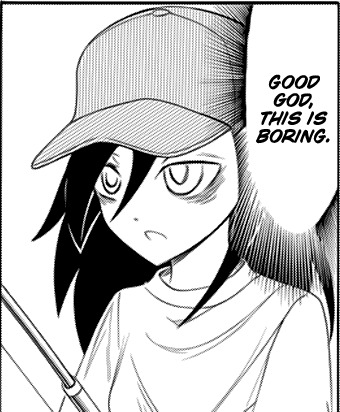
I’m with you, Tomoko. But even if I don’t like fishing myself, I can respect people who do. I’d like to think that activities/sports like fishing and golf, where a lot of the time is spent in anticipation, is something that only appeals to certain kinds of people. Those who enjoy it may appreciate the atmospheric tension, but for those who are eager only for the results, it probably looks monotonous.

That doesn’t surprise me. Tomoko was probably at that age where going fishing was considered a summer highlight. It’s one of the various activities parents often have their kids do to broaden their horizons, and while such things are fun to an extent, they usually become a thing of the past once you’ve settled on your own hobbies. Perhaps I’m projecting my own experiences onto Tomoko, but I’d like to think there’s a bit of truth there.
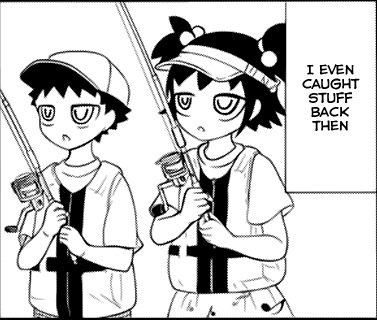
Twins.
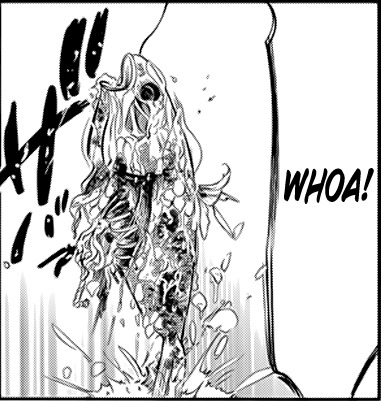
So apparently hooking half-dead fish is something that actually happens? Nasty.
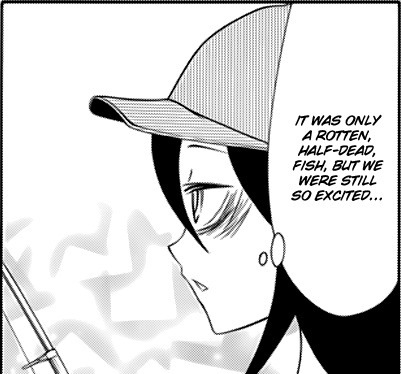
Tomoko as a kid, like many others, probably was blinded by some childlike wonder that blocked the harsher realities in favor of that feeling of accomplishment that comes with catching fish. Now that she’s older, fishing is just another facet of reality she’s become apathetic about. Looking back, the things that Tomoko used to associate with adulthood like coffee shops and cabaret girls probably wouldn’t register on her radar now as they did back then.
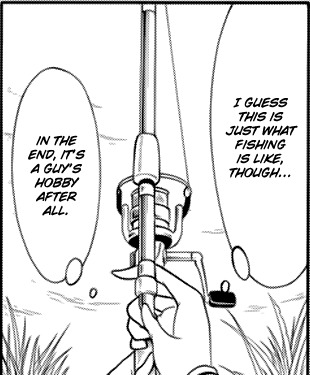
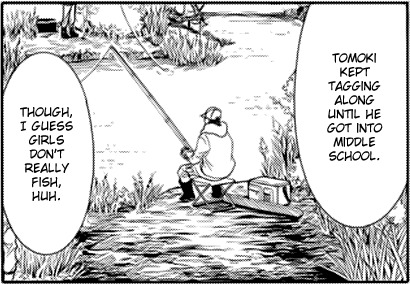
That timing seems about right. We know that Tomoki became less excitable at the start of middle school, so that’s probably when he became “too old” for fishing.
At this point, I guess I ought to talk about Tomoko’s dad. Previously, what little we knew about him was restricted to the fact that he has the busy life of a salaryman, and the implication that’s he’s a pretty chill and open-minded guy (the massager incident being the prime example). I do appreciate that while he’s aware about things like gendering, he doesn’t discriminate and has no issues on bringing Tomoko along for a “boy’s hobby” despite her now being a “young woman”. I live in a culture where fishing with your dad is often seen as “father-son quality time”, which is why the activity is usually associated as being something masculine. This could be an instance of the mangaka’s own open-minded views being expressed through Tomoko’s dad, one could say. All in all, I’m glad that for all of Tomoko’s problems, having a dysfunctional family has never been one of them.
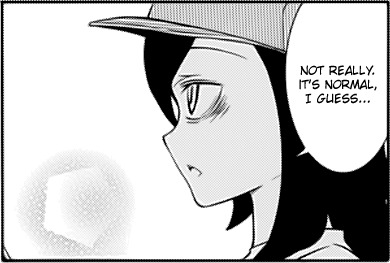
You know that feeling you get when you build up a goal so fantastically in your mind, but once you have it, the high wears off almost instantly. We as readers can enjoy the dramatic irony of Tomoko’s response since we’ve seen firsthand how relatively exciting her school life as been as of late. But the big point is that Tomoko’s change in-universe was very gradual. She’s never had to make some grand epiphany about her social life because it happened so seamlessly to the point where it became nothing special, or “normal” for her. And honestly, that’s probably for the best.
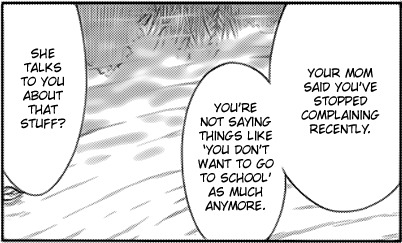
That’s something we’ve all noticed, I believe. All those chapters of Tomoko wanting to ditch school come to mind. But looking back, Tomoko distaste for school was mostly due to having an unfulling school life than any dislike for the schoolwork. Though I imagine that the old Tomoko would reason the exact opposite so she wouldn’t have to face the hard truth.
C’mon, Tomoko. Don’t you know parents always talk about their kid’s problems in secret?
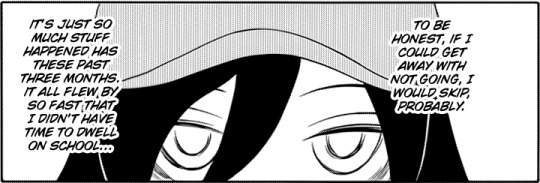
Exactly my thoughts. If she were being conscientious about it, Tomoko would skip school if she really could. But after making her new circle of friends, the drudgery of school was no longer a large part of her mindset, and was pushed to the back of her mind when dealing with her new buddies took priority. This was most evident back in chapter 109, where Tomoko admitted she was glad to go to school even when she didn’t really have to. I’m not sure if she’s fully realized it herself, but Tomoko’s mind has come to connect the school environment with her new social life, hence why most of her displeasure towards the former is all but gone.
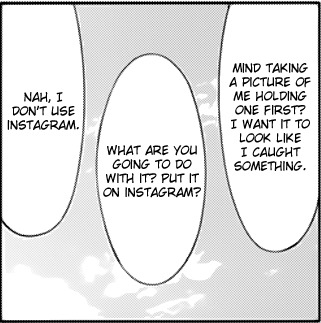
Tomoko, an Instagram girl? Get real, dad.

She said the “f” word...*wipes away fanboy tear.*
You know what’s great, though? It’s that she said it so casually. Even Yuri had to stammer a bit before she could say the word “friend”. Though, having Yuri say it first probably broke the ice and gave Tomoko the assurance to say it too. Still, it’s nice to hear her speak so confidently about them.
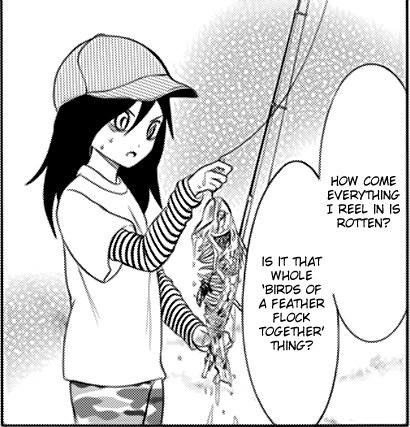
These moments where Tomoko is shown to be acutely aware about her own twisted personality really sheds some light about how she perceives herself. She knows she’s about 50% unlikeable, but where she used to try and “better” herself in the past, she’s now much more unforgiving about this side. Frankly, I find Tomoko much more likeable for accepting herself than those times when she could pass as an oblivious jerk. She’s much more intentional in pulling back her nastiness (though it still slips out at times), and that effort on her part is commendable.
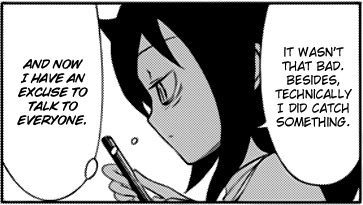
Relatability Rating: 12/10.

So the eyes are genetic after all. You know, if we were shown this panel with no context whatsoever, I’m sure many people would mistake that eye for Tomoki. Tomoko we’d pick out no problem since that hair horn is all we need to identify her.

Remember what I said about Tomoko knowing when to let out her creepier side?
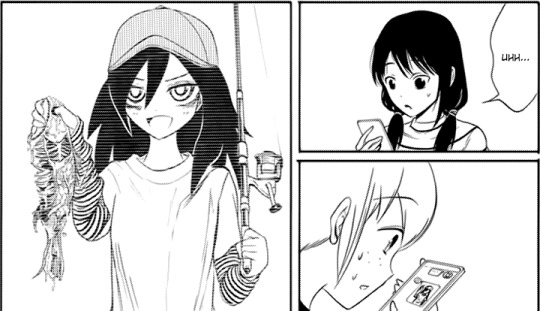
Well there ya go.
But in all seriousness, there’s a lot to take from this sequence. The biggest and most obvious takeaway is that Tomoko feels the need to put on an air of innocence with the photo she sent to Yuu, but with Yuri and Mako, her freakier side is a lot more transparent. Even more so, she just seems a lot happier in the photo she sent to her schoolmates.
Does this mean that Tomoko is actually more comfortable with Yuri and Mako now than she is with Yuu? That’s both sweet and kind of depressing, but I think it needs to be stated that while Tomoko does seem to be more cheerful in the second pic, that doesn’t necessarily translate to her liking her schoolmates more than Yuu. I do admit that Tomoko does appear to drifting away from Yuu, but that alone doesn’t mean she likes Yuu any less than she did before. Keep in mind that Yuu is still her only friend whom she can share in her otaku interests. Perhaps Tomoko is just being more mindful of her, i.e. no longer casually harassing her. As for Yuri and Mako, she’s already built herself up as a weirdo, so there’s no harm in expressing that side of her. Tomoko just plays up different parts of her personality depending on the friend she’s with.
Too bad she didn’t send anything to Komiyama or Yoshida. If she had, I imagine it’d probably be a third pic of her trolling them hard.
Thanks for being patient with my review. I couldn’t wait to get this out, but as expected, boot camp eats up my time. But on the positive side, I feel a lot more engaged when I write these out on my breaks, and that can only make these reactions better in the long run.
Now I know I just said I shouldn’t predict too much about future chapters at the start of this review, but I’m curious to see people’s predictions on who’ll be in Tomoko’s third year class.
My guess: Yuri, Ucchi, Okada, Katou...and Komiyama.
#watamote#watamote review#no matter how i look at it it's you guys' fault i'm not popular!#chapter 121#tomoko kuroki#watadad#watamom#tomoki kuroki#yuu naruse#yuri tamura#mako#review
27 notes
·
View notes